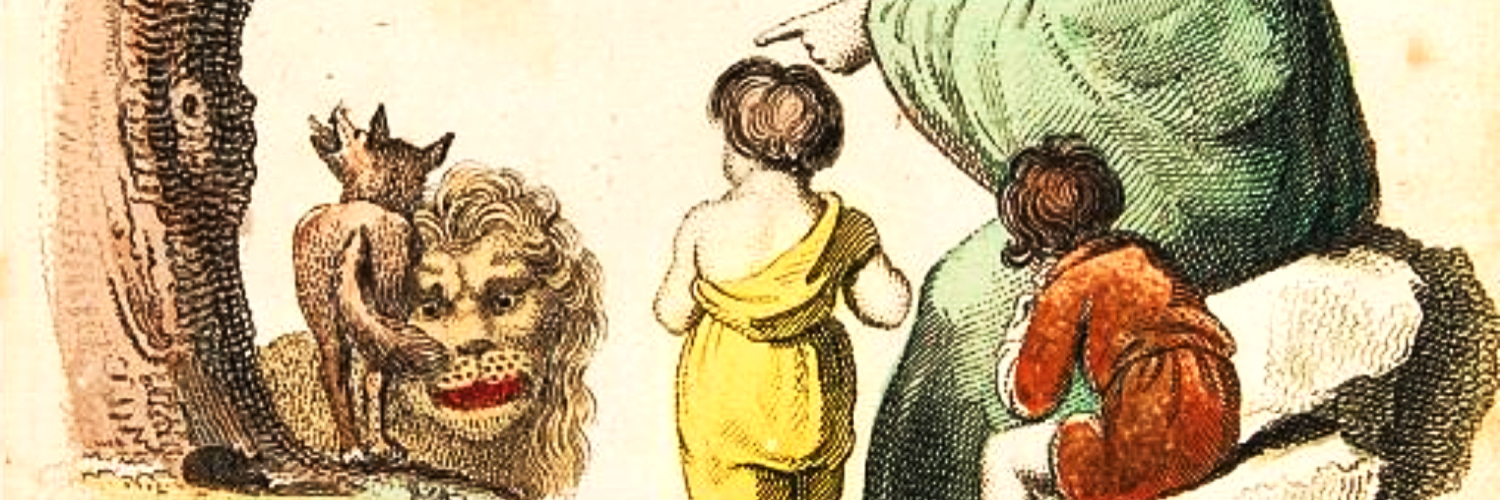FABLES
ANCIENT AND MODERN.
ADAPTED FOR THE USE OF CHILDREN.
BY EDWARD BALDWIN, ESQ.
Second Edition.
Vol. I.
Adorned with Thirty-six Copper-Plates.
London: Printed for Thomas Hodgkins, At the JUVENILE LIBRARY,
Hanway Street (Opposite Soho Square), Oxford Street; and to be had of all Booksellers.
Printed by B. McMillan,
Bow Street, Covent Garden
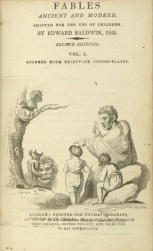
Preface.
There are two or three features that I have aimed to bestow upon these fables, by which they might be distinguished from the generality of fables I have seen;
and, as every author has not the skill to make his intention visible, and every reader is not a reader of penetration, I will briefly mention what these features are.
I have long thought that fables were the happiest vehicle which could be devised for the instruction of children in the first period of their education. The stories are short; a simple and familiar turn of incident runs through them; and the mediums of instruction they employ are animals, some of the first objects with which the eyes and the curiosity of children are conversant.
Yet these advantages are too often defeated by the manner in which fables are written, and in which they are read.
They are written in too simple a form. Too simple in language and sentiments they cannot be. But many fables in the commonest books of this sort are dismissed in five or six lines.
This is wrong; it is not thus that children are instructed. If we would benefit a child, we must become in part a child ourselves. We must prattle to him; we must expatiate upon some points; we must introduce quick, unexpected turns, which, if they are not wit, have the effect of wit to children. Above all, we must make our narrations pictures, and render the objects we discourse about, visible to the fancy of the learner.
A tale which is compressed, dry, and told in as few words as a problem in Euclid, will never prove interesting to the mind of a child.
In the present volumes I have uniformly represented myself to my own thoughts as relating the several stories to a child. I have fancied myself taking the child upon my knee, and have expressed them in such language as I should have been likely to employ, when I wished to amuse the child, and make what I was talking of take hold upon his attention.
Half the fables which are to be found in the ordinary books end unhappily, or end in an abrupt and unsatisfactory manner. This is what a child does not like. The first question he asks, when he has finished his reading, if he is at all interested in the tale, is, What became of the poor dog, the fox, or the wolf? While the stories were told with the customary dryness, this was not of much importance; but, the moment a character of reality was given to the narrative, it cried aloud for correction. I have accordingly endeavoured to make almost all my narratives end in a happy and forgiving tone, in that tone of mind which I would wish to cultivate in my child.
Lastly, in the ordinary fable-books every object, be it a wolf, a stag, a country-fair, a Heathen God,
or the grim spectre of Death, is introduced abruptly: and, as few parents, and fewer governesses, are inclined to interrupt their lessons with dialogue, and enter into explanations, the child is early taught to receive and repeat words which convey no specific idea to his mind. I have endeavoured never to forget, that the book I was writing, was to be the first, or nearly the first, book offered to the child's attention. I have introduced no leading object without a clear and distinct explanation. By this means the little reader will be accustomed to form clear and distinct ideas.
By this means my book is made a compendium of the most familiar points of natural history and the knowledge of life, without being subjected to the discouraging arrangements of a book of science. I have intended, as far as I was able, that these volumes should surpass most others in forming the mind of the learner to habits of meditation and reflection.
CONTENTS OF VOL. I.
The Shepherd's Boy and the Wolf
The Travellers and the Money-Bag
The Miller, his Son, and his Ass
The Town Mouse and the Country Mouse
The Old Man and the Bundle of Sticks
The Country Maid and her Milk-Pail
The Poor Farmer and the Justice
The Mouse, the Cock, and the Cat
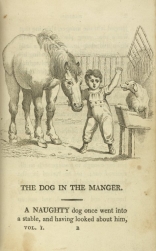
THE DOG IN THE MANGER.
A naughty dog
once went into a stable, and having looked about him, jumped into the manger, thinking that was a nice, snug place for him to lie down and sleep in. Presently a little boy came into the stable, leading his papa's horse, that had been ploughing a whole field, and was very tired, and very hungry. Come out, poor fellow! said the little boy to the dog, papa's horse wants to eat some hay. But the naughty dog never stirred a bit; he only made up an ugly face, and snarled very much. The little boy went close up to him, and endeavoured to take him out; but then the naughty dog barked and growled, and even tried to bite the little boy. The little boy was not big enough to manage such an ill-natured cur; so he turned in the horse, and stood by to see what would happen. The horse looked very hungry, and very tired, and put up his head to the rack to get a mouthful of hay. But the naughty dog snapped at the poor horse's mouth. The horse was very sorry, and would have said, Pray dog, let me eat! if he had been able.
But the naughty dog did not care. You silly dog, said the little boy, hay is of no use to you, dogs do not eat hay, though horses do; and if you stay there, you will soon be as hungry as papa's horse. So the dog staid a long while, and by and by he grew hungry, and came to the little boy, and begged for meat. Silly dog, says the little boy, if I were as naughty as you, I should give you nothing to eat, as you prevented papa's horse from eating. There is a plate of meat for you; and remember another time, that only naughty dogs, and naughty boys and girls, keep away from others what they cannot use themselves.
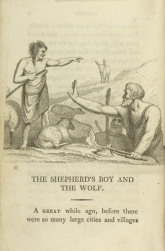
THE SHEPHERD'S BOY AND THE WOLF.
A Great while ago, before there were so many large cities and villages as there are now, all the countries in the world abounded with wild beasts. England in particular was full of wolves;
and little boys and girls dared not walk abroad without somebody to take care of them, for fear the wolf should come and eat them up. In the times I am thinking of, nobody had invented a plough; so there was no corn. The wild men then kept sheep; they had mutton for their dinner, but neither turnips nor bread to eat with it. Men staid all day with the flocks, to take care that they did not lose themselves, and that the wolves did not come to eat them; for wolves were always very fond of mutton, and, when they were hungry, would come and kill a sheep or a little lamb for their dinner. A wolf had at any time rather have a lamb than a child. Sometimes when the men were very busy, mending the thatch, or cutting down fire-wood (for there were no coals and no tiles), they would send their children, boys of ten or twelve years old, like Charles, to take care of the flocks of sheep.
The boy I am going to tell you about, was a very naughty boy, and his father and mother could never make him do as he was bid. He was always laughing when he should have been minding his lesson; and he often did mischief and thought it a very good joke. Says his father to him one day, Winter will soon be here, and I must go to the forest and cut some fire-wood: you are hardly big enough yet to take care of the sheep, but I must trust you to look after them. That I will, father! says the boy, for he was proud to be of some importance. I and three or four of my neighbours, said the father, shall be within call, and if you want any help, you must bawl to us as lustily as you can.
Away went the boy, and took the sheep-dog with him, and drove the flock to pasture. He sat down upon a hillock to look at them; he patted his dog, and when any of the lambs straggled from the rest, he sent the dog to bark at them, and make them come back.
This was all very well; but presently he thought, Now I will have a joke. Every thing was quiet about him, when he set up a great scream, Father, father, the wolf, the wolf is coming. Away ran the father and the neighbours, leaving their work, some with sticks, and some with hatchets, to help the poor boy and drive away the wolf. When they came, all was quiet, and the boy burst into a great laugh, to think he had made a fool of his father. His father was very angry, and said, Child, how could you call us away from our work, and tell us a lie? I could not have thought it of you. But the naughty boy did not mind.
The next day the father went again to the forest, and sent his son to mind the sheep. Presently he began to cry, The wolf, the wolf! and every thing happened as before, except that his father was this time more angry, and told him he should go to bed without his supper. But the silly boy was still pleased with himself, that he had once more, as he called it, made a fool of his father.
It was now almost evening, and the sun began to set, when the naughty boy saw two great, fierce wolves running toward him as fast as they could. He was terribly frightened; and by ill luck the dog had gone after a rabbit or a bird, and could no where be seen. The boy screamed dismally: The wolf, the wolf, Oh father, the wolf! Then he ran to beat the wild beasts with his crook; but they scared him, and he ran back again. Then he screamed more and more. His father and the wood-cutters heard him plain enough, but they said, It is only that mischievous boy; he shall make fools of us no more. So the wolves ate up so many of the flock, that the father was ruined, and obliged to part with the rest, and go a-begging: and, when the boy grew up to be a man, people still pointed at him, and said, That is the son, that told lies, and ruined his father.
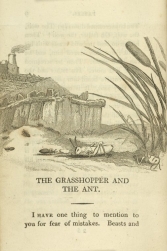
THE GRASSHOPPER AND THE ANT.
I have one thing to mention to you for fear of mistakes. Beasts and birds do not talk English; but they have a way of talking that they understand among one another, better than we understand them; and you, if you attend to your dog, or your cat, or your horse, may generally make out what he wants from his voice or his look. I am going sometimes to tell you what an animal says; that is, I am going to put his meaning into English words.
But let me say one thing more. It is not always necessary that a story should be true. Some stories are true, and some are invented; and, if they are very prettily invented, we are much obliged to the people that made them. A lie is what naughty folks say, that they may deceive; like the boy and the wolf. But, if I tell a pretty story of a dog and a fox, or any other animals, I do not mean to deceive, I only mean to tell a pretty story. Now then I begin.
An ant is a very wise, though a very little animal, and lays up food in the summer when there is plenty, against the winter when there is none. He is thoughtful and serious. A grasshopper is the merriest creature in the world; he sings all the summer long; but, when the winter comes, he dies of hunger and cold.
A grasshopper, as the story says, at the beginning of a hard winter, happened to meet an ant. The grasshopper was very hungry. He looked at the ant, as much as to say, You are a very wise animal, and have got a store-house full of corn. He then plucked up a spirit, and cried in a melancholy tone, Pray, Mr. Ant, give me a grain of your corn! That I will, said the ant, and fetched him a little. But do not come to me any more; perhaps you may find other charitable ants not far off another day. I have only enough to last my own family, who all helped in collecting it. Ants are very sorry to see other animals starve, but animals that can work for themselves, and will not, and, as the saying is, do not make hay while the sun shines, cannot always expect to have their idleness maintained by our industry. People will think much better of a creature that is sober and pains-taking in time, than of one that, for want of taking pains, is obliged to go a-begging.
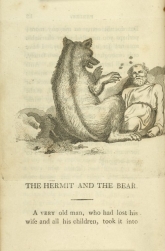
THE HERMIT AND THE BEAR.
A very old man, who had lost his wife and all his children, took it into his head that he would go and live by himself in a cave, surrounded on all sides by a vast, desolate forest. He was a very good man, doing kindness to every body when he was able, and every body loved him. If a traveller lost his way in the forest, and was hungry, and weary, and benighted, the old man would give him part of his supper, and invite him to lodge in his cave. This good creature was kind even to animals;
he would not hurt a spider; and in the winter the little robins came, and fed upon the crumbs of bread that he scattered for them at the mouth of his cave. They saw that he never hurt or frightened them, and they would pick out of his hand the biscuit he crumbled for their breakfast.
One day as this good hermit was taking a pleasant walk, he heard the groans of an animal in pain. He looked through the bushes, and saw a vast, overgrown bear stretched at the foot of a tree. At first he was rather alarmed; but, when he looked a little longer, he saw the bear was very ill. He then came round and showed himself; and the bear looked at him in a pitiful manner, and held up his foot. The hermit saw that it was very sore, and very much swelled. The poor creature had somehow got a hurt in it a week before, and it had grown worse and worse, till the bear could not walk. The bear could not go for victuals, and victuals did not come to the bear, so that he was in danger of being starved. The hermit took compassion on the animal; he ran and got water and washed his foot; he put a little balsam to it that he had in his pocket, and then fetched him something to eat. He now visited the bear every day, till he was well enough to walk.
The first walk the bear took, he would go home with the hermit. The old man did not much like it; he would have been better pleased with a dog for his companion; but the bear did it all out of love. When they came home, the bear would stay and live with the hermit. Bears are clever animals, and can do many tricks; though naughty people use them very cruelly, pretending to teach them to dance.
Particularly they can climb trees. The hermit was feeble and stiff of his limbs, and could not do that; so this bear climbed trees for him, and shook the boughs, and made the apples and chestnuts fall for the old man's supper.
One day the hermit had taken a longer walk than usual in a very hot sun, and after dinner he laid him down near his cave and fell asleep. The bear, as usual, watched close by him to take care of him. As the weather was sultry, the flies came about the hermit, and lighted on his face, and tickled him. The old man shook his head, but did not awake: the bear growled, but the hermit was in a sound sleep, and the flies did not care for his growlings. At last one saucy fly pitched upon the old man's nose. Now, thought the bear, I shall have you; and with that he took up his paw to give the fly a good knock. The fly was killed; but the poor hermit's nose was terribly bruised, and after a time turned quite black. Immediately the hermit awoke, and began to be very angry; but he put up his hand to his nose, and the dead fly fell upon it: he then knew what the bear had been doing. Go, go, said he to the bear, shaking his head with the pain; I will always do you all the good I can, but we will not live together any more. He that admits into his company an awkward and ill-matched favourite, will sometime or other have reason to grieve, even for things that were intended in kindness.
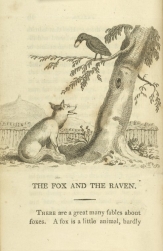
THE FOX AND THE RAVEN.
There are a great many fables about foxes. A fox is a little animal, hardly so big as a middle-sized dog. He lives in the woods, and is never tamed. He is very fond of fowls and geese, and steals them, whenever he can, for his dinner. The farmers therefore are his great enemies; for they do not like, when they have been at the trouble and expense of breeding the poultry, that the fox should come and eat them up. The fox however is a cunning little fellow; he is full of stratagems and wiles; and when we speak of any body that is very sly, it is usual to say, He is as cunning as a fox.
A fox, as Esop says, happened one day to be very hungry. He was walking along quite serious, for people are apt to be serious when they are hungry.
He spied a raven perched in a tree, with a delicate cheese in his beak. I suppose this cheese must have been about the size of a baked apple; I believe they make such in some countries.
The fox thought with himself, I dare say that is a very nice cheese; I wish I could taste it. But what could he do? The raven sat upon a high branch; the fox did not know how to climb to him. If the raven would consent to fight for the cheese, the fox perhaps could have beaten him. But, suppose the raven had been upon the ground, he had fine large wings and could have flown away with the cheese.
While the fox was thinking thus, he fixed his eyes on the raven. What a beautiful bird you are! says he. I never saw any thing so glossy as your shining, black feathers. What a twist you have with your neck! And what a noble beak! I dare say it holds that cheese as tight as if it was a pair of pincers. Do you know that I think you the finest bird I ever saw; and, if your singing is but equal to the manner in which you hold yourself, the nightingale must be nothing to you.
Now you must know that the only noise a raven can make is as frightful a scream as you every heard. Whenever he begins, I am always disposed to put my fingers to my ears. But this silly bird was delighted with the fine speeches of the fox; he knew that his feathers were as black as the cunning creature said, and that he had a good, handsome beak of his own; and he began to think that perhaps he might be a fine singer too. So he tuned his pipes to try; the cheese dropt out of his beak; this was all the fox wanted; he caught it up, and ran away with it, and left the raven to sing to the crows.
Foxes are never taught what is good and what is naughty. But, if I were a little boy or a little girl, I would rather go without cheese all the days of my life, than gain it by such cheating and wicked speeches as this fox is said to have made.
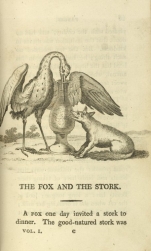
THE FOX AND THE STORK.
A fox one day invited a stork to dinner. The good-natured stork was pleased with the civility, and had no doubt that the invitation was meant in kindness. But the fox intended no such thing; he had nothing in his head but the hope to make game of an animal, who, though of a remarkably sweet temper, he thought was not so wise as himself.
The dinner consisted of a fine, rich soup; for foxes and storks never want but one dish to a meal. The fox set it before his guest in a very broad platter, so that, though there was enough of it, it was hardly more than half an inch deep.
To understand the fox's joke, you must consider the different ways that beasts and birds have of taking their food, and particularly what is liquid. Beasts have a long tongue; look at the cat when she is drinking her milk; she puts out her tongue, and laps it up in a minute. It is very droll; you could not drink your milk as she does. Birds on the contrary have a long bill that they put into the cup, and suck up as much as they want. Neither beasts nor birds drink as little boys and girls do.
The soup was set smoking before them; it had a fine savoury smell; and, if the stork was sharp-set
before, the smell now gave strength to his appetite. He put in his bill, and the fox put in his tongue; but the soup was so shallow, that the stork could scarcely suck up any thing. The fox however found himself very well off, and swallowed it all in less than a minute. Then they parted with many civilities, and the fox said, he hoped he should soon have the pleasure to see the stork again.
The stork did not care much about the dinner; his home was not far off; he had plenty there; and, spreading his wings, he soon got to a place where he could fully make up his disappointment. But he was sorry to see any animal capable of so ill-natured a joke. In spite of all his good temper, he was a little angry; and he determined to show his inviter, that foxes are not more cunning than other animals, if they would condescend to play such pitiful tricks.
The next day the stork met the fox. Come, my friend, said the stork, yesterday I dined with you; you must do me the pleasure to eat your mutton with me to-day. The fox consented; he apprehended no trick; he said to himself, Such a good-natured creature as the stork would not ask me, if he had not something nice to treat me with.
The stork's dinner was meat, minced very fine, and put into a long narrow-necked bottle. I beg, friend, says the stork, you will stand upon no ceremony with me; I hope you will make as free as if you were at home. Saying this, he put his long beak into the bottle, and quietly began his dinner. The fox did not know what to make of it; at first he licked the gravy and the little morsels that ran down the side of the bottle; at last he began to grow angry. He said, this was not usage for a gentleman, and he would take care to remember it another time.
I hope then, said the stork, you will remember also the dinner you gave me yesterday; I would not punish you too severely; you may go without your dinner for one day, and never be starved. Remember too this maxim, which you will find has a great deal of good sense in it, He that cannot take a joke, should never have the assurance to make one.

THE STAG DRINKING.
You have heard, I dare say, how fond some gentlemen are of riding a hunting, and what a fine sport they think it is. For my part, I could never quite reconcile myself to the idea of such sport. There is hare-hunting, and fox-hunting, and deer-hunting, beside the hunting of lions and tigers and other ferocious animals. I think more has been said about deer-hunting, than any of the rest; and there is a fine old song upon that subject, called Chevy-Chase.
The way is for the gentlemen, very early in the morning, to mount upon a number of fine horses, which for their fleetness are called hunters, and to call out a pack of dogs bred for the purpose, that are to run after the deer, and that will, when they have caught it, tear it almost to pieces, if the gentlemen do not interfere. As soon as the gentlemen have all got on their horses, the huntsman, or groom, blows his horn, and away they ride. When they come to a field, or a proper place, the huntsman makes the hounds smell all about, till they find the smell of the deer. At this time of the morning, the grass is covered with dew, which the hounds brush away, as they run. When they have roused the deer, the poor creature is terribly frightened, and sets off as hard as he can, and the dogs after him, and the gentlemen after the dogs. The deer sometimes runs forward, and sometimes almost back again, that he may get rid of his pursuers; but the dogs follow him by the smell he leaves on the grass, and wind backward and forward just as he does. Sometimes he takes a great jump to break the line of the smell, and sometimes he swims across a river. After some hours running he is generally caught at last. Poor deer!
The flesh of deer is called venison, and is thought to be much better than beef and mutton.
For my part, I do not quite like this hunting the deer. Do not you think it very cruel, to call the frightening a poor creature, and at last perhaps killing him, fine sport? The deer is a beautiful animal. The male is called a stag, and has grand, branching horns. The female is called a hind; she has no horns, but is a very handsome, innocent-looking creature. The young deer is called a fawn, and is so pretty and good-natured, that ladies formerly would call the fawns to come and lie down in their chambers. The coat of the deer is of a beautiful brown, sometimes a little reddish, sometimes speckled and mottled with white, and, when the animal is in health, is as smooth as velvet.
A stag once, who had lived free and happy in the forest where he was born, after having frisked about, and eaten his dinner of grass, wanted to drink. There was a pretty running stream not far off, as smooth and as clear as glass. The stag knew this stream very well, and had often tasted its sweet, cool waters. While he was drinking, he could not help seeing himself in the stream; and, when he had done, he stopped a little longer, to admire his own face, just as I have seen little girls admire themselves in a glass. He nodded his head. I declare, said the stag to himself, I think I am very pretty: my eyes are so bright, and my nose is so small and slender! But above all, these fine branching horns, what a grace they have! I do not wonder that all the young hinds should fall in love with me, and wish me for a husband. Yet I am surprised they dare to be so familiar with so noble a creature, and lick my neck with their tongues, as they do sometimes.
The stag then began to look a little further. And yet, thought he, I do not half like these legs. They are so slender and insignificant! They look like four spindles. What a creature should I have been, if these pitiful shanks of mine had been answerable to the majesty of my horns!
The stag staid so long, considering and commenting upon his different parts and members, that at last he heard the cry of the hounds. I do not know whether he had ever heard it before; but animals seem from the first to know who are their enemies. The little mouse ran away the very first time she saw a cat.
Away started the stag, and most gloriously he scampered. He ran faster than the dogs. After all, thought he, these legs are not such bad things. If they are thin and light, they seem on that account only to carry me the faster. Thinking thus, he still ran as hard as he could, up hill and down dale, across the high road, then into a turnip-field, and next over a meadow. At last he came to a wood; and, trying to force his way through it, he entangled his horns so among the bushes, that he could not get free. The hounds came up: but the gentlemen were close by, and generously saved him from being mangled and killed, as he otherwise would have been.
Well, thought the stag, when he saw himself safe, I have learned a lesson to day, that I shall remember as long as I live. Another time, when I undertake the decide upon the value of a thing, I will consider, not merely whether it looks beautiful, but what use is to be got from it. I now know that swift legs are more worth having, than the most magnificent horns that ever were seen.
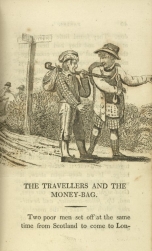
THE TRAVELLERS AND THE MONEY-BAG.
Two poor men set off at the same time from Scotland to come to London. They found little employment at home, and they had heard that their trade met with better encouragement in the capital. They had very, very little money, and were obliged to go all the way on foot. As they were both going to the same place, they thought they might as well be company for each other.
These poor men knew very little of each other before their journey. But they said, we are men, and men ought to lend a helping hand to one another. If we have nothing but bread and cheese to eat, it will be pleasant to sit together and eat it under the same hedge. If we sleep upon straw, it will be delightful to say, Good-night, Good-night, before we close our eyes, and, Up, fellow-traveller, and be stirring, when we wake in the morning. One said, I can whistle a number of good songs; and the other answered, Though I cannot whistle, I know many pretty stories, some that will make you laugh heartily, and some that will almost make you cry. This was all the bargain they made, and then they set out.
Nothing very particular happened the two first days, except that, as it is almost impossible to travel without money, the little they had at first, was now grown less. On the third day they were almost come to York. It was quite dark, when one of them stumbled over something in the road, and taking it up, found it was a canvas money-bag, or farmer's purse. It was heavy with money. The one who took it up was an ill-natured, selfish fellow, that always wanted to keep every thing that was good to himself. Aha! said he, I am in luck to-day; I have found a purse of money. Just then they passed a cottage with a light in the window. Let me see, said the finder, going close to the window, and looking at the money—four, five, six guineas, and nineteen shillings, and I dare say a matter of five-shillings-worth of half-pence.
I declare I have a great mind to buy a little horse, and ride the rest of the way by myself.
Friend, said his companion, you ought not to have said, I have found a purse of money, but We have found it. I am sure you know it is a rule among poor people when they travel together, to call any thing they find in the road a God-send, and share it equally between them.
You may think as you please, said the other; but I shall not part with a farthing of it. I will buy a horse as soon as we get into York; and shall mount my nag to-morrow morning, and wish you a very pleasant walk from York to London.
He that did not find the purse was now ready to cry, not so much on account of the money, though that would have been very acceptable to him,—as for vexation to think that a fellow-countryman and fellow-traveller could be so selfish and ill-natured. He had not time to cry however, when they heard three or four horsemen coming along the road, riding pretty fast, and yet talking very earnestly. They listened to the talk, and found the horsemen were speaking of a farmer who had been robbed by highwaymen as he went home from York-market, and had lost his purse, containing six guineas, and nineteen shillings in silver, and five-shillings-worth of half-pence.
Come along, said the selfish traveller, all in a sweat, to his companion, let us turn into this wood, and hide ourselves. If they find us with the purse in our possession, they will think we are the thieves, and we shall be hanged.
I shall do no such thing, said the other; these people want to return it to the right owner, and the right owner must have it. Besides, you are no longer a fit fellow-traveller for me. You would not allow me to say, We have found a purse, when you thought nobody would claim it, and I do not understand your saying, We shall be hanged, when pursuit is made after the thief.
The horsemen, though they could not see the travellers, heard their voices, and called to them to stop. They did so, and were questioned, and obliged to deliver up the purse. It would have gone still harder with the selfish traveller, who trembled and stammered so much, that they thought he was the thief; but his generous companion, who had intended no harm, told a plain, honest story, that convinced the horsemen, who in consequence dismissed them both. I am glad, said he, to have done you this service: we are now almost at the gates of York; I shall therefore only bid you good night, and wish you to-morrow, as you intended to do by me, a very pleasant walk from York to London.
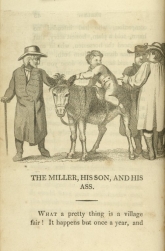
THE MILLER, HIS SON, AND HIS ASS.
What a pretty thing is a village fair! It happens but once a year, and the young lads and lasses all come there in their best clothes. There are two or three streets of booths, slightly put together of boards for the occasion, that are taken down and carried away, as soon as the fair is over. It lasts sometimes one day; sometimes two: two is quite enough. These booths are hung with ribbands, and cloaks, and silk-handkerchiefs for sale. Upon the table of the booth are laid knives, and scissars, and snuff-boxes, and boxes of Tunbridge-ware,
and dolls, and drums, and fifes, and flutes, and fiddles, and Jew-harps,
and rattles, and pretty pictures, and children's books,
and sugar-plums, and ginger-bread, and oranges, and nuts, and apples. Johnny buys Betty a fine taudry ribband to tie round her cap. Whatever one person buys, and gives to another, is called a fairing. Then the fair is crowded with pretty clean boys and girls. They beat the drums, and squeak with the flutes; and there is such a noise, you cannot think how much. Every body is in a hurry, and busy, and happy. When I was a little boy, I remember I thought I never saw so charming and happy a place as a village-fair.
But every body does not come to the fair for amusement; some people have very serious business. The buyers are amused with their purchases; but the sellers are very grave, thinking how much money they shall carry home to buy beef and mutton for their wives and children. The serving-men and serving-maids come to hire themselves: servants in the country always hire themselves for a year, till next fair-time, at the least; and a very good servant loves his master as much as if he were his father, and is as unwilling to go away from him. Then there is a field, not far from the booths, where horses are bought and sold, and sometimes cows, and asses, and sheep.
A miller once set off for a village-fair, about four miles from his mill, to sell his ass. I am afraid this miller had grown poor, else I do not think he would have sold his ass. The miller was an old man with white hairs, that walked along leaning on a stick. He took with him his son, a pretty little boy, about seven years old, who had a great desire to see the fair, and his father told him that, if he sold his ass well, the little boy should bring home a drum.
Away they went; the miller very thoughtful and very serious, for he was a seller; the boy, as merry as a cricket, kissed his father's hand, and thanked him a thousand times for being so good as to take him to the fair. But, Charley, my boy, said the miller, you must walk all the way: I am an old man, and cannot get along without a stick, and yet I shall walk: You were seven years old last birth-day. If we fatigue our ass with riding upon him, he will not look handsome, and people will not believe he is so good an ass as we have found him to be. We will rest for an hour or two on the grass, and have a little bread and cheese and ale, before we set off to come home again.
Oh, father, says the little boy, I am sure I can walk very well; and, if I find myself a little tired in coming home, I will beat upon my new drum, and the sound of that will make me as fresh as if I had not moved a step.
So they went along to the fair. Many people were going the same road to the same place, some on horses, some in carts, and even those on foot, most of them, walked faster than the old miller and his little son. These people were very merry; and some of them, as merry people are apt to be, a little impertinent.
What fools are that old man and his son, said one, to walk on foot, when they have an ass so well able to carry one or the other!
The miller was very good-natured, and not willing that any body should be displeased with what he did. He was a little afraid before, poor man, whether Charley would be able to hold out. So he took up the little boy in his hand, and set him on the ass; and Charley was not at bottom displeased with the change, though he was a very good boy, and cheerfully walked a-foot, when his father bid him.
By and by three jolly farmers rode by. They stopped to look at the travellers. Why, you lazy little urchin, said one of them, are not you ashamed to be riding at your ease, while your poor old father trudges by your side?
This speech made poor Charley feel very uncomfortable. He had always been a dutiful child, and could not bear to have it thought otherwise. He began almost to cry. He slid down from the ass as fast as he could, and said, Pray, pray, father, do you ride, and let me walk. The miller did not like that any body should form an ill opinion of Charley, and consented.
The next party that came up was three farmers' wives. What a pretty boy! said one of them. A little weakly or so, but that only makes him look more delicate and interesting. I am afraid one of his feet is hurt with walking; look if he does not go a little lame! What a brute of a man must his father be, to jog on at his ease, and make this sweet child limp after him as well as he can! The miller heard, and changed his plan. Come, Charley, said he, we will both ride; I hope ever body will think that right.
The next man that came meant I believe to play the rogue. He had heard what the others had said, and smiled to see the good-natured pains the miller took to please every body. Pray, friend, said he to the father, is that ass your own? One would think not by the unmerciful way in which you load him. But, I suppose, you expect to kill him by the journey, and to sell his skin at the fair to make pocket-books.
The miller had tried almost all the schemes he could think of, and had not been able to pass along without being jeered at. At last he thought of one more. He pulled a large stake out of the hedge; he got a rope, and tied the ass's feet, two and two, together, and made them fast to the stake. Now, Charley, said he, as the ass must not carry us, let us try to carry the ass. I confess this was a very silly scheme; but what could the poor miller do? Charley could hardly lift his end of the pole. Ha! ha! ha! Hoh! hoh! hoh! said the people, this is the strangest sight we ever saw.
All this passed just by a bridge. Before they had got two steps upon the bridge, the ass was frightened with the noise, and struggled very much; Charley lost his hold; and the ass fell into the water. It was well for the poor creature that they had not got to the middle of the bridge; otherwise, with his legs tied together, he could not have helped himself, and must infallibly have been drowned.
Come, Charley, said the old man, I see what a foolish mistake I have made. We ought to listen to the opinions of such as have a great deal of kindness and a great deal of sense to advise us, but not to the gabble of people who perhaps make their silly remarks only in hopes to vex the passers-by.
So they went on to the fair in the same manner that they had set out. If people laughed or jeered, the miller took no notice, but quietly kept on his way. Conducting himself thus, he speedily sold his ass; and Charley came home with his father after dinner, beating his drum, and laughing within himself at the people that had laughed at him in the morning. He was however sometimes sorry at heart, when he recollected that he should perhaps never see his dear ass again.
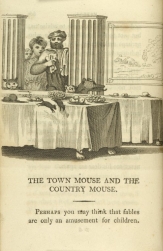
THE TOWN MOUSE AND THE COUNTRY MOUSE.
Perhaps you may think that fables are only an amusement for children. But, without mentioning to you how highly Esop and the other famous makers of fables have been thought of all over the world, I am going now to tell you a thing which will convince you how much you are mistaken.
You have heard of Rome, a fine old city of Italy. The consuls and emperors of Rome once governed the world, that is, as much of the world as they knew almost any thing about, for America and Botany-Bay
had then never been heard of. In the time of these consuls and emperors there were a great many clever men, that wrote a great many wise and learned books. They are called the Latin authors. Now of all these Latin authors it is agreed that Virgil and Horace are the finest. I will tell you a fable that was written by Horace; and, if ever you learn Latin, you shall then read it in Horace's own words.
There was a mouse that lived in the country; I dare say at Horace's farm that he was so fond of;
for Horace lived at a pretty white house with green window-shutters; he had a large garden of vegetables and flowers; with a fine fish-pond in front; and behind, a beautiful serpentine walk through a wood.
This mouse had a cousin that lived in town. I believe his home was at the palace of Mæcenas, the emperor's prime minister of state, that was built with pillars of marble, and ceilings of stucco-work.
Now, though the house where the country-mouse lived was only a sort of a cottage, a little better than the ordinary cottages round it, yet he loved his relations and friends, as much as the best mouse that wore a head; and he begged and prayed his town-cousin to come some day and take a dinner with him. The town-mouse consented.
When the visitor came, the country mouse showed him all he had to show, the fish-pond, and the garden, and the wood, and how prettily the white house looked with the green window-shutters. They sat down to dinner. The host had ranged all the provisions in a hollow tree, that they might be sure not to be disturbed. He placed a nice soft cushion of moss for his guest, and set before him a little piece of bacon, and a morsel of beef that had been boiled for soup, and a bit of cheese, and a golden pippin.
The country-mouse sat in a lower place, and ate nothing but a crust of bread, and a piece of the hard rind of cheese, leaving all the rest for his cousin. He was as polite to his visitor as a mouse could be, and hoped he would be able to make a dinner, and assured him that the cheese was made of the finest cream, and the pippin was fresh gathered. The city-mouse however made a miserable meal; he could not relish such country-fare. After dinner he asked his entertainer very gravely, how he could be content to waste his life in such a wretched hole? Consider, said the town-mouse, you are now young, and should enjoy yourself. You should see men and cities. When once you know the world, you will despise this rustic life as much as I do. The town-mouse gave the country-mouse such an account of what a fine thing it was to go to court, that at last he consented to go back with him to the palace of Macenas on the Esquiline hill.
A long and weary journey they had of it; and, though a man could have walked it in three or four hours, a mouse was obliged to sleep one night on the road. They got to Rome the next night, and crept silently and softly to the town-mouse's home. The country-mouse was out of his senses to see what a fine home it was. The rooms were almost as large and lofty as a church; the walls were adorned with looking-glasses and gilding; and immense chandeliers of silver hung from the ceiling.
I confess, says he, I begin to think Horace's farm was but a miserable hole.
I thought, answered the town-mouse, I should bring you to your senses.
He then led his visitor into the room where Maecenas and his friends had dined. The mice climbed up upon the table. There was nothing left but the dessert; but such a dessert! There were pine-apples, and ice-creams, and melons, and grapes, and preserves, and perfumes, and sugar in abundance.
The town-mouse felt himself at home. The country-mouse frisked about as if he had been mad. He had never seen such a sight in his life. Why, here, said he, are provisions enough to last Horace for a month!
He was so long smelling and examining the different plates, that he had not tasted a bit, when the door burst open. It was the butler and five or six footmen, who were come to clear away the dessert, and prepare every thing for their master's supper.
With them pranced in a couple of fine Italian grey-hounds. But, what was worst of all, at the heels of the grey-hounds came, jumping along, the largest tom-cat you ever saw. The mice were terribly frightened, and scampered away as fast as they could. But the walls of the marble dining hall were so well fitted, that there was not a chink for so much as a spider to hide himself. It was almost a miracle that the mice escaped, and at last got to a dark, dirty hole in some wainscot, where the town-mouse was accustomed to sleep.
Come, he said to his guest, I dare say you are tired; you will stay snug here to-night.
Not in a minute, said the country-mouse, that I can help! As soon as every thing is once more quiet, I will take my leave of cities and ministers of state for ever. I dare say I shall not recover the fright I have been in for a fortnight. Give me a temperate life and a safe one. I shall thank you, the longest day I have to live, for the lesson you have taught me. I shall go home now, and know, better than ever I did before, the blessings of a hollow tree and a crust of bread.
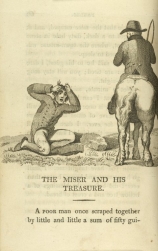
THE MISER AND HIS TREASURE.
A poor man once scraped together by little and little a sum of fifty guineas.
It was all got by the labour of his own hands, and I believe it was some years before he had made it so much. In the village where he lived they had known him from a boy, and a smart, merry boy he was. He was always laughing from morning till night. This was certainly laughing too much; but the boy meant no harm, and every body laughed with him. Poor fellow, he had never learned to read or write; he thought he had no chance to be wise; he had heard something about merry and wise; and, as he could not be wise, he determined to be merry, that he might be sure to be something.
Well, when he was about twenty or thirty years old, the fancy took him, that he would save a penny or two-pence a day, till he had got fifty guineas. If he saved only two-pence a day, he must have been fifteen years about it; but I believe he got some presents, and a little matter that his father and uncle left him when they died, which made him not quite so long. I wonder what he intended to do with his fifty guineas when he had got it? Did he mean to buy a horse? or a pleasure-boat? or a fine gold watch with a gold seal to it? What could he do with fifty guineas? You shall hear: but do not be in a hurry now!
It was very hard for him always to lay by two-pence out of the wages of his day's work. He never bought any oranges or cherries. When other people went to the fair, he staid at home. When other people got a little bit of meat or of cheese, he had nothing but dry bread for his dinner; and, instead of beer, he drank only water. I assure you, when people work all day ploughing or digging, they ought to drink beer, and some strong beer too.
But what people thought the strangest of all was, that this fellow who had been so merry and good-natured a boy, grew very serious, and, what was worse, very ill-tempered too. He hardly ever spoke, and when people asked him a question, he answered them as roughly as possible. The fact was, he was always thinking of his money, and the thought of it would not even let him sleep of nights. Then he was so much troubled what to do with it, and how to keep it safe. When he lived in a house, it was a poor sort of a house, with a door that a man could almost burst open with his foot: and, when he lived in a lodging, he had but one room, and other people sometimes came into the room. So he went to the schoolmaster of the village, and begged the favour of him to take care of it. The schoolmaster was a very good man, and kept it quite safe. But the poor man was not a bit the easier: he thought the schoolmaster might lose it, might have his house robbed, or might die and the people who came after him might not believe that so great a heap of money belonged to so poor a man. As he could neither write nor read, he did not understand much about receipts and promisory notes.
At last, when he had made it up full fifty guineas, he went to the schoolmaster, and begged he might have it in his own possession. And now we come to see what he did with it. He thought about horses and pleasure boats and watches. But none of these things pleased him. When he got home, he crept into the darkest corner of his room, and began to count his money. He thought fifty guineas in gold looked prettier than all the horses and pleasure-boats in the world. But where should be put them? He thought of twenty people to take care of them, and twenty places to hide them. At last he collected a solitary field a great way from any path, and he determined to bury them there. He went to the field, and walked round the field, and looked in every corner. By and by he spied a large stone which stuck so deep in the ground that nothing but the top of it could be seen. With a good deal of trouble he pulled it up. There was then a deep hollow place. The miser now took out his hedging-knife, and made a round mark in the middle of this place, and shoveled out the mould, till he had got a hole big enough to hold his fifty guineas. He then put down the stone again, and it lay as close and as snug as if it had never been moved.
It was a good while before he could prevail upon himself to go away. Once or twice he raised the stone gently by one corner, and peeped in: there were the guineas! He had not gone the length of two fields, before he came back. He looked all round to see if there was any body near: he then raised the stone as before: there were the guineas! He came twice again before night, and the last time, he took out his money and counted it.
Unluckily Wicked Will happened to be all the while at work on the other side of the hedge. Wicked Will was a good-for-nothing, drunken fellow, and had neither truth nor honesty in him. If the miser had come but once, Will would have thought nothing of the matter; but he was surprised to see him come so often. He recollected what a scraping, saving man the miser was, and began to guess the truth. Night was no sooner completely come, than Will went to the spot, took away the money, and walked and ran twenty miles before day-light, that he might never be found.
The next morning, as soon as it was light, the miser set out again to look at his money. I firmly believe he would never have been able to do a day's work as long as it staid there, he would have wanted to look at it so often. You may think then how sorry he was, when he raised the stone, and found it gone. He cried and screamed, and acted like a madman. He staid there so long, that at last the farmer to whom the field belonged, opened the gate and rode in, to consider whether he should lay the field down for grass, or plough it for corn. He presently saw the miser and his distress.
What is the matter with you, my good fellow? said the farmer.
Oh, my money, my money! said the miser.
What money?
Oh, my money! my fifty guineas!
Where are they?
I buried them yesterday under this stone, and they are gone.
Buried them! said the farmer, that is a strange way to treat money. Why did not you keep it at home, and then it would have been always ready for use.
Use! said the miser. I would not have spent a penny of it, to save myself from starving. For all the world I would not have made it a farthing less than fifty guineas.
Oh, if that is the case, said the farmer, there is a number of pebbles in yon corner; fetch fifty of them, and put them in the hole, and they will do every bit as well as guineas for every thing but use. If you had saved a little against you were sick or lame, I should have thought you a wise man; but if you had determined never to change one of your guineas, take my word for it you have lost nothing at all.
Now what do you think happened after this poor miser? He never got his money again. For some days he was so sorry, that he could hardly go to work. But by degrees he forgot his loss: and then, I cannot tell how it happened, when he was no richer than his neighbours, he ate better, and whistled better, than when he had fifty guineas that he had resolved never to change.
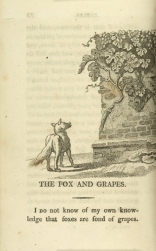
THE FOX AND GRAPES.
I do not know of my own knowledge that foxes are fond of grapes. But Esop says they are, and that is enough for us.
A fox once found his way into a very fine garden. I suppose he had missed his road, for the favourite walk of the fox is into the poultry-yard, that he may pick up a chicken or two for his dinner. Here there were a great many fine flowers; but the fox did not care for that. Men are very fond of flowers, and so are bees and other insects; but birds and beasts think nothing about them; you never saw either smell at a rose. There was also a great deal of fine fruit: and, as Esop's fox was fond of grapes, I dare say he was delighted to see the apples and pears and nectarines and peaches. He walked up and down the garden, and was so pleased with every thing, that for the life of him he did not know what to chuse.
At last he came to a wall that was all covered with the finest grapes you ever saw. They were full of juice almost ready to burst; the purple ones were turned black, and the green were so ripe, that they looked as if you could see through them. I said, the wall was covered with grapes; but that is not quite exact. The ladies and gentlemen had gathered all the clusters that hung within their reach; but higher up the vines were still full. The moment the fox saw them, his choice was fixed: he resolved to make his dinner here without seeking any further.
The fox is a very little animal, though he is very nimble. His ambition was greater than his strength. He jumped and jumped, you never saw such jumps in your life. First he could not jump high enough; but afterward he mended his jumps, and I believe jumped quite as high as the clusters. But, I do not know how it was, not a single grape he could catch. At last he was quite tired and almost lamed with the efforts he had made. The fox was extremely mortified. He looked up; there hung the grapes, but not one for him! He determined then to carry off his disappointment with a spirit. What a fool have I been! said he. I can see now plain enough that the grapes are sour, and not fit to be eaten.
From this fable it has come to be a proverb, when a man pretends not to wish for what he cannot have, to say to him, The grapes are sour. If you ask a poor haymaker, whether he would not like that the parsonage-house were his? perhaps he will answer, No, indeed, he likes his mud-cottage as well. The fox was not wrong to endeavour contentedly to go without what he could not get, but he need not have told an un-truth.
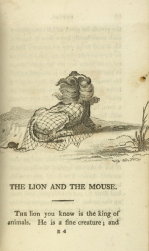
THE LION AND THE MOUSE.
The lion you know is the king of animals. He is a fine creature; and the proofs he gives of his strength are such as we hardly know how to believe. He is said to be very generous. He is so formed that he must have meat to eat, and there are no butchers' shops in the forests; so he is obliged to kill his meat himself. But they say he never kills any creature for sport or cruelty; and that he will not touch a man, but when he is almost starving with hunger. He is very proud, and will never eat of a dead body that any other animal has killed.
A lion was once sleeping in a forest. A poor little mouse, that thought no harm, was playing about, and in one of his frisks ran against the lion, and awaked him. The lion, angry with being disturbed, and not knowing who had done it, put out his paw, and took up the mouse. The mouse was terribly frightened, and thought he was going to be killed in a moment. The life of a mouse is of quite as much value to him, as the life of a rhinoceros. But, when the lion looked at his victim, he could not find in his heart to hurt such a poor little fellow. He set him down very gently. The mouse scampered away as fast as he could, and was so overjoyed with his escape, that he had not time to say, Thank you! to the king of beasts.
A few days afterward, as the lion was prancing away, and amusing himself in the forest, he happened unawares to entangle himself in a large net that some sailors had spread, who wanted to catch a lion for king George, to be put into the Tower of London.
When he felt his situation, he was full as much frightened as the mouse had been the other day. He struggled, and sprang, and tossed himself about, but all to no manner of purpose; he only made the business worse. He roared with terror, till all the forest rung with the sound.
The poor mouse, who was not far off, heard the noise, and knew the voice of the animal that had treated him so generously. He ran to examine what was the matter, and whether he could give any assistance. He presently saw how it was. A mouse, though so very little, is an extraordinary animal, and can gnaw through brick-walls. He set himself to gnaw the meshes of the net, and he was never tired till he had done his work. In two or three hours he had gnawed through so many threads, that the lion rose up, as free a beast as ever. The lion was inexpressibly astonished at his deliverance and his deliverer; and you may think how glad he was that he had behaved generously, when the mouse offended him, and woke him out of his sleep.
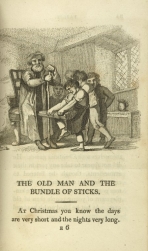
THE OLD MAN AND THE BUNDLE OF STICKS.
At Christmas you know the days are very short and the nights very long. Yet neither young people nor old want to sleep more at Christmas, than they do at Midsummer. Therefore they are obliged to employ and amuse themselves more in the house and less in the fields at Christmas than they do at Midsummer. This is the original reason of Christmas games, of puzzles, and riddles, and Do you know how to do what I can do?
One of these games is, I can put the candle where every body in the room can see it, and you cannot: can you do that?
An old man was sitting by his fireside, while his children were amusing themselves with Christmas games. He did not appear to take any part in their amusements, though he listened to every thing that was going on. Christmas games are more properly the employment of young people than of old ones. At last he lifted up his head and said, One of you, bring me faggot of sticks from the woodhouse! Sam ran away, and fetched it in a moment. What do you want it for, father? said he. I am sure there is a very good fire.
You have all been telling your puzzles, said the father; now I will tell you one. Which of you can break this bundle of sticks? I can, said Sam; and I can, said Bob. For young people almost always think they can do every thing, before they have tried, or considered how it is to be done.
Put the bundle down, said the father, and let the youngest try first. William is too young; but I dare say Charles thinks he can manage it. They all tried from the youngest to the eldest. One lifted it up, and clapped it to his knee. Another put it on the ground, and put his knee to it; a third sat upon it; a fourth stamped upon it; a fifth proposed pinching it with the hinge of the door. We cannot do it, father, said they. Then I will, replied the old man.
Fetch me a knife! Oh, father, said Charles, you asked us to break the bundle of sticks, not to cut it. Be quiet, boy! said the old man.
The faggot was bound together with a sort of cord of withy.
The old man cut this cord. The faggot immediately tumbled to pieces. He then took up the sticks, one by one, and broke them, as easily as you would crack a nut. The boys all laughed till they could not contain themselves. But the old man went on very gravely, till he had broken every stick in the faggot. What fools we were not to think of that way, said one, and said all.
Very true, my boys, answered the father. In almost all cases it is by wit more than by strength, that difficulties are conquered. He that works with his head, will accomplish his object with the tenth part of the toil, that another must employ, who has hands, but no head.
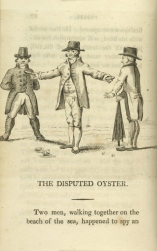
THE DISPUTED OYSTER.
Two men, walking together on the beach of the sea, happened to spy an oyster.
Aha! said one of them, look here, my friend! what a fine oyster! Both of them happened to be very fond of oysters; but your oyster-eaters say, an oyster is spoiled, if it is cut; and they had neither of them a knife. What was to be done? I cannot tell what two generous men would have done in such a case, but each of these men loved an oyster better than his friend. They both ran to take up the poor fish; they knocked their heads against each other, and were almost going to fight.
Come, come, said one, we will not go to blows about an oyster neither! That would be too foolish. The rule is, He that sees a God-send first, he is the man. In that case, said the first, the oyster is mine, for I showed it you. Do not pretend I am near-sighted neither, said the second; I have as good eyes as my neighbour. A long while before you spoke, I saw something lying on the beach, and was almost sure it was an oyster. They could not settle who saw it first.
They might have drawn lots, or tossed up a halfpenny, to see who should have the oyster. But they were grave gentlemen, and thought that was too childish a way to settle an affair of this importance.
As they were in the height of their dispute, a droll fellow happened to be coming along the beach, who lived in the same village. We will take Tom Smith to be judge, said one. Agreed, said the other. Tom came up, and they told him the story.
So you are determined to go to law before me for the oyster?
We are.
Silence the court! Who has got an oyster-knife?
They had neither got a knife. In their great hurry to eat the oyster, they forgot that they could not open it. Tom had got one.
Now, gentlemen, let me hear the pleadings on both sides: what have you to say for yourselves?
I spoke first! I saw it first! I have the best right! I have a better!
Tom opened the oyster. He looked at one of the claimants, and then at the other, and then at the oyster. It was a fine fat fellow as ever you saw. Nothing could be more tempting. Tom put it to his mouth, and swallowed it in a moment. He then with great gravity gave the two disputants each of them a shell. They stared.
You agreed to go to law for the oyster, said Tom. Did you never hear that people who go to law for something they dispute about, are often obliged to pay as much as it is worth in expences, and at last get nothing better than an oyster-shell for their pains?
So both the men laughed heartily at Tom's wit, and owned that he could not have decided better. He had got a fine oyster, and they had got a lessons at least as good as an oyster, by the bargain.
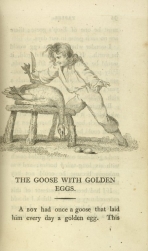
THE GOOSE WITH GOLDEN EGGS.
A boy had once a goose that laid him every day a golden egg. This must be one of Esop's geese; there are no such geese in our days.
I wonder what a golden egg would be worth. If it were all solid gold, it would be worth at least fifty pounds.
Fifty pounds a day, is eighteen thousand two hundred and fifty pounds a year;
so that this boy was tolerably rich.
Rich men are sometimes apt to be whimsical; it is no wonder therefore that a rich boy should have been so. What could he want to buy, that fifty pounds a day would not purchase? I suppose he wanted to buy a gold watch, and a gold-lace coat, and a gilded coach with six long-tailed horses; and was unhappy because he could not buy them all in one day.
If I had been the possessor of this extraordinary goose, I think I should have loved her very much. I never had a dog, or a cat, or any living creature, that I called my own, and that depended on me for its food, that I did not love, and take a great deal of care of. For this goose I would have inclosed a beautiful field with iron palisades for the goose to walk in, and have made a clear fish-pond in the middle of it for her to swim in. I would have made a nice warm shed for her to sleep in, with a fresh bed of clean straw every day. I would have fed her with the finest barley, and have given her plenty of geese, and ducks, and swans, if she liked it, to keep her company. I could have done no less, for the most profitable friend I had.
The silly boy I am telling you of did none of these things. I believe he took care that nobody should steal her. She had lived with him several years, and never failed of her egg a day; so that the ungrateful boy did not think himself at all obliged to her for what she brought him, and would have been very much out of temper with her, if she had once missed of her egg.
Well, this boy, as I was telling you, did not think fifty pounds a day enough, and was very unhappy that he had not got more. He wanted to have every thing at once. With such a quantity of money he was never used to be disappointed; and, when he had spent his fifty pounds in the morning, he was sure to see several things before night, that he wanted to buy, but he was so poor that he could not.
I am ashamed to tell you what this wicked boy did. I have already mentioned that he did not love his goose at all; and, though she did so much for him, he did not feel thankful to her. Would you believe, that he got a great knife, and he killed her?
You perverse ill-natured goose! said he, Why then did not you lay me two eggs a day? Why did you always keep me so poor?
As she brought him an egg every day, he thought he should find a great many eggs in her belly. There was not one. He found nothing but a little barley in her crop,
which in time would have enabled her to lay more eggs.
The boy now was as poor as any of the poor beggar-boys you see in the streets. They were obliged to take him into the parish-workhouse that he might not be starved; and I cannot say that I greatly pity such an ungrateful, wicked boy.
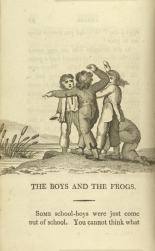
THE BOYS AND THE FROGS.
Some school-boys were just come out of school. You cannot think what a noise they made. They seemed to be all talking at once. One snatched off another's hat, and ran away with it. A second jumped over his comrade's back. Some wrestled; some ran, and almost pushed one another down. They were all in high glee.
They presently came into a field. Some had bats and balls; some had marbles; and a few came to fly their paper-kites. In one corner of the field there was a pond, and by the side of the pond there was a number of frogs that were basking and amusing themselves. Poor harmless frogs! Why should not a frog be happy as well as a boy?
One inconsiderate boy caught up two or three stones, and began to throw them at the frogs. When one boy does a naughty thing, others are very apt to do the same. I will lay you a halfpenny, said one, that I can hit that large old one. I will hit that little skinny one in a corner, said a second, which is harder to do than yours.
Esop says, one of the frogs, seeing the cruel mischief that was going to happen, spoke to the boys. I rather think it was one good and humane boy that spoke to the rest. I will tell you however what was said.
Stop a minute, I beg of you, and consider what you are going to do. If you had one of the frogs in your hand, which I would not advise you to take, because I should be afraid you would hurt him, you would feel how his heart beats. What bright shining eyes he has got! What a vast way he jumps! How nimble he must be! God gave him his eyes, and his legs, and his joints, and his heart, and all his motions. If you threw a stone at me you might hurt me very much. But to throw it at a poor little frog! You might break one of his legs, or two, or dash out his brains. If you killed him, he could never take his pretty jumps any more, but would lay as still as the stone you have in your hand. If you broke his legs, he could not help himself, but would pine a day or two in misery, and then die. When you are laughing, always consider whether the same thing that makes you laugh, makes some other creature cry, or be miserable. None but a brute of a boy, who deserves to have every bone in his skin broken, would knowingly laugh at another's misery.
These boys were convinced, and all of them agreed that they would never more run the risk of breaking a frog's legs, or knocking out one of his eyes.
I am sorry to say, that boys are too apt to be cruel. They will sometimes throw stones at the pretty birds as they hop along in the hedge. But what I think is worst of all, is taking away the birds' nests, and thus making a mother miserable for the loss of all her young ones. A bird's nest is her home and all her happiness: what good can it do to you to disturb her? I hope, my dear Charles,
I may depend upon you, that you will never do such things.
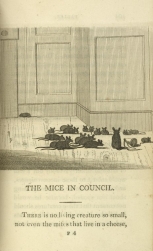
THE MICE IN COUNCIL.
There is no living creature so small, not even the mites that live in a cheese, as not to be capable of feeling both pleasure and pain. It is a great pity that we cannot live without hurting any thing; but we cannot. The great fish eat the little ones; the great birds and beasts prey upon the small; even the little birds eat worms and flies; and we eat oxen and sheep and calves. When they are dead, we call them beef and mutton and veal, and are glad to forget that they were once alive.
It is very right to kill some creatures because they hurt us. It is not at all necessary that we should have our clothes full of fleas, or our houses full of rats and mice. Nobody but a fool would submit to these inconveniences, and have his house and every thing about him spoiled, because he would not consent that these creatures should be killed. If we did not kill the rats and mice, we should presently be in the situation of the king and queen in the story of Dick Whittington, who, as soon as their diner was set on the table, saw it devoured by these creatures, before they had time to touch a bit.
Our rule therefore should be, never to kill any creature but in case of necessity, and never to be wicked enough to make sport to ourselves of other creatures' pain.
I day say you know why it happens that you can scarcely go into a house where you will not find a cat. The reason is because cats are very clever at catching the rats and mice. The greatest praise you can give to a cat, is to say that she is a good mouser.
There was once an old house that from the cellar to the garret abounded with mice. It had been a good, handsome house once, but now it was so old that nobody lived in it, and it was hired by some one for a store-house. In one part of it he put books, in another part blankets and drapery, and in another sacks full of corn. No part of this store was spared by the mice. They nibbled and tore the books, and gnawed the blankets, for their sport; and they dined every day plentifully on the gentleman's corn. He presently saw that he had better have no store, than have it all spoiled and devoured by the mice. He therefore brought a fine cat, that loved him very much, and that he had taken great care of ever since she was a kitten; and left her to catch the mice. The cat understood her business very well; the mice had no apprehension of an enemy; and an immense number of them were killed.
Those that were left alive began to perceive their situation, and kept close in their holes, where the cat could not follow them. They wished now that they had let alone the gentleman's books and blankets, and had fed more sparingly on the corn. Perhaps then he would not have brought his cat into the house. They dared not stir, night or day. They thought the cat was always awake. They sleep of a cat is very light, and the smell of a mouse will make her jump up and run at any time. They were almost starved to death.
At length they got all together in some corner, out of the cat's reach, with the intention to consult what they should do. This meeting was nothing like what their meetings had been before the cat came. Then they had all of them their bellies full, and were merry, and capered and frisked about like mad things. Now every one was hungry and melancholy. Half their numbers were missing; fathers and mothers and children had all fallen a prey to the terrible cat. Some remedy was grievously wanting against the attacks of the furious wild beast. But the wisest mouse among them could not tell what remedy to recommend.
While the old ones sat mute with doubt and alarm, a pert young mouse said he had thought of an expedient that would exactly do. Perhaps, said he, none of you have considered the case so closely as I have. If you do but recollect, you will find that even a cat can be in only one room of this large house at a time, and that all the difficulty is to know which room that shall happen to be. A mouse has as many legs as a cat; and we could presently get out of her reach, if we did but know when she was coming. But the misfortune is, that she creeps along slily, and is upon us in a minute, when we are thinking nothing of the matter. Now my advice is, that we should get one of those little hollow bells, that children sometimes hang to the neck of a kitten, and fasten it upon this cat, and then I defy her to creep so slowly, but that this bell shall go tingle, tingle, every step she takes.
All the young mice were in admiration at the wise speech of their play-fellow. They agreed that he was a mouse of genius, and a great benefactor to the whole community of mice. What happy days they should pass, when the bell was once hung about the cat's neck! They should laugh at their old enemy, and might peep out, and then scamper away, before she could catch them.
As soon as silence was made, the oldest mouse of the company begged to be heard. He said that the speech of his pert young friend was a very wise speech indeed! The expedient he had hit upon was excellent, and it was impossible to make more than one objection to it. That was, who should hang the bell upon the cat's neck? But, as they had the happiness to have one mouse among them of so great wisdom, perhaps they might have another not inferior in courage, who would do the feat that the young gentleman had recommended.
The young mice saw that the old one was laughing at them, and he that had made the speech, was so ashamed, that he slunk away to his hole. At last I believe they agreed that the best thing they could do, was for all of them to go away, and look out for some other house, that was not guarded by so ferocious a cat.
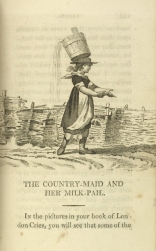
THE COUNTRY-MAID AND HER MILK-PAIL.
In the pictures in your book of London Cries,
you will see that some of the hawkers carry their wares in baskets upon their heads.
There is the fruit-man, Buy my strawberries! fine, scarlet strawberries! and the fish-man, Buy my lobsters! buy my pickled salmon! I have often wondered that, as they walk careless and merry along the streets, their baskets do not topple off upon the pavement. The milk-maids sometimes carry their pails of milk in the same manner; and this I am told is much more common in France than it is in England.
A country-girl was once walking with her pail-full of milk upon her head: I suppose she was a French girl. She was generally as merry as a cricket; you never saw a creature with such life and spirits. She was always chattering, and her chatter was extremely diverting to almost every body that heard it, because she was very good-natured. The only person that sometimes was not diverted with it was her mother, because this merry disposition of the girl continually made her forget something that her mother had told her to do. The mother was a very good, but a very poor woman; with a great deal of care she saved enough in the week to buy them a Sunday's dinner, and with a great deal of hard work she made their little room as clean as a penny to eat it in. The girl very cheerfully helped her mother in all this; she rubbed and scrubbed as well as the best. But then, as I told you, she was so thoughtless; she lost one thing, she broke another, she tore her shift, and forgot to buy capers
to the mutton. You will be surprised when I tell you that this faulty girl was as tall as a woman: her mother was quite ashamed of her. You are sometimes thoughtless now; but I am sure you will cure yourself soon, and when you are sixteen or twenty, will be the most considerate creature in the world.
The mother had tried a hundred ways to cure her. Sometimes she scolded the girl, and then the girl cried bitterly, for she could not bear that her mother should be angry with her. Sometimes the mother cried too, and said gently, Now, Phillis, you have broken the dish that should hold our Sunday's dinner: indeed you will ruin me by your carelessness! They had nothing to live upon but the profits of the milk of one pretty cow, which they carried every day and sold at the market-town.
At last the mother thought that, if she gave the girl something of her own, she would learn to take care of that. So she said, Phillis, if you will be a good girl all this week, you shall have Saturday's pail of milk to yourself, and all that it sells for shall be your own. The girl was very proud of this proposal, and thought it would be so womanly to go to market with something she could call her own; she tried to be very good. One morning she forgot to take off the cream, before she drew the milk from the leads
to carry it to sell, but, as this was the only fault she committed in the whole week, her mother forgave her.
Saturday came, and you may now see Phillis with a pail of milk on her head that was all her own. Now, said Phillis to herself, I will be the most careful and thrifty creature that was ever heard of. Every body shall be surprised, and say, Is this our Phillis? You cannot think how rich I will grow! Let me see! This pail of milk will bring me in a matter of five shillings. I will lay out all of my money in eggs. At a penny a piece I shall have sixty eggs. These eggs I will hatch, and they will bring me so many chickens. I do not know whether Phillis had thought of how she was to hatch them.
It will be very hard, said she, if these sixty eggs will not produce me at least forty chickens. My chickens at only a shilling a piece will fetch me two pounds; and two pounds will buy me a sow. With this sow I shall have a fine litter of pigs, which I shall fat for almost nothing. The money that I shall sell my sow and pigs for, will buy me a cow, and this cow will have a calf. What a pretty calf it will be! I have no doubt it will love me very much, and will come jumping along the field to kiss me every time it sees me.
Phillis was so pleased with the notion of the pretty calf jumping along the meadow to meet her, and then holding up its sweet mouth for a kiss, that she quite forgot the pail of milk, and could not help jumping herself at the thought. Down came the pail in a moment; the milk ran in twenty streams on the ground, and away swam the eggs, and the chickens, and the sow, and the cow with her pretty calf, that Phillis had been thinking of with so much delight.
This was a lesson to poor Phillis, that she never forgot; the next time she had a pail of milk to her own share she never offered to jump; but I am not sure that she made quite so large a profit of it, as we have seen her put together in her castle in the air.
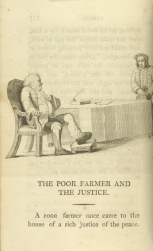
THE POOR FARMER AND THE JUSTICE.
A poor farmer once came to the house of a rich justice of the peace. Having told the servant at the door that he had something of importance to communicate, he was led through a lane of five or six footmen, by several parlours, into the drawing-room where his worship was sitting. The justice, who fed every day upon turbo and venison,
was very ill of the gout,
reclining on his elbow chair, and with his foot supported upon a velvet cushion in great pain. The farmer, who had a great deal of work, and no superfluity of provisions, had not a pain or an ache about him. The farmer pulled off his hat, scraped his foot upon the floor, and stood very humbly at the further end of a long table.
Well, fellow, said that justice, what dost come to me about?
An please your worship, said the farmer, I have a sad story to tell.
Hah! you have always sad stories to tell. You little farmers are for ever falling out among yourselves, and then you come and plague me with your quarrels.
But this is all between me and your worship. I have an unlucky bullock that is for ever breaking out of pasture, and now he has got into your worship's best field of corn, and has spoiled a matter of half an acre. Now I want to know what you would have me do in the case.
Well, said the justice, I cannot but say that thou art an honest fellow, to come and tell me of it thyself: and, as that is the case, I shall merely send my bailiff to look at the waste, and what he says it comes to, thou must pay. I shall beside expect, as thou saist that thy bullock is an unlucky one, and for ever breaking out of pasture, that thou shalt kill him immediately.
Bless your honour! said the farmer; what was I saying? I have only two or three harmless cows in the world. No; it is your honour's famous red bull, that frightens all the children, and that neither locks nor bars can confine, that has broken into my corn, and terrible work he has made of it. To be sure I thought I was ruined. But, being as how your worship talks of sending your bailiff to see what the damage comes to, and killing the bull immediately, why I am satisfied, and I humbly thank you.
The justice was terribly ashamed of himself. If the farmer had said at first that it was the justice's bull that had done all the mischief, I am afraid he would have set a very different face on it. But he thought he could not sit there as a justice, and say that there was one rule for a rich man, and another for a poor one. So he sent his bailiff, and paid the waste, and the poor man was contented with this, and excused his worship from killing the bull.
When the farmer went home, he did not half like what he had done. Says he to his wife, Meg, I have told a sort of a lie, and this money will never prosper with us. I will carry it to the church-porch,
and have it laid out in bread for the poor in the work-house; and another time I will rather stand by the loss of half a field of corn, than not tell the honest truth at once.
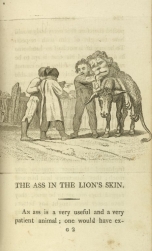
THE ASS IN THE LION'S SKIN.
An ass is a very useful and a very patient animal; one would have expected therefore that every body would have thought of him with respect. To be sure he is not half so handsome as a horse, and his coat is apt to be ragged; but, poor fellow! he cannot help that. The only noise he is able to make is called braying, and you never heard a noise more contemptible and disagreeable. But the worst of him is that he is very slow and awkward in his motions; whatever you do, my dear child, take care not to be slow and awkward in going about it.
A poor ass had long been the sport of all the boys in a village; they shouted and hooted after him, and frightened the poor creature very much; they sometimes beat him and threw stones at him; for vulgar and ragged boys are apt to be cruel, they have never been taught any better; then the ass ran and galloped away from them as fast as he could. All this happened in a country where lions live; I suppose in Africa.
One day this poor ass came to a place when he saw a lion's skin lying on the ground. How I wish I were a lion! thought the ass. Then, instead of these naughty boys frightening me, I should be able to frighten them. Sometimes they have thrown an unlucky stone, which has made me lame for several days; but, if I were a lion, I would not hurt them, I would only terrify them soundly.
Thinking thus, the ass turned over the lion's skin: it was a very fine one. It would make a nice, warm coat for me, thought the ass: and with no more ado he began to put it on. He rolled himself up very snug in it, and pulled down the skin of the lion's head over his face. He then looked at himself in the river. I am vastly like a lion, thought the ass: I dare say I can make my tormentors think I am one; they are only silly boys. So away he went to try.
The ass, quite proud of the new appearance he had put on, trotted along toward the village. Presently he came to where some boys were playing at marbles. To be sure the trotting of an ass is not very much like the port of a lion; but the boys were much too frightened to observe that. They thought they should be eaten all up in a moment. They screamed; and, in their hurry to get away tumbled over one another. They then got up and ran; and away trotted the ass after them.
This succeeded wonderfully well the first day, and the ass was delighted to terrify these naughty boys, who had so richly deserved it. The next day he came again; but he thought the boys did not run so fast as they had done before. He knew that the most alarming thing even in a lion is his tremendous roarings, and he determined to roar too. So he opened his mouth as fiercely as he could; but, alas! instead of a roar, there came out nothing but a bray. It was so loud a bray, that all the fields resounded with it. The boys were astonished. One or two of the boldest stopped, and began to look suspiciously at the pursuer. When any body pretends to be what he is not, if you stop to examine him, it is all over. Aha! Mr. Donkey, said they, is it you all this while? A cheat! A cheat! Cheats are always found out.
The boys however somehow came to know, that, if the ass had happened to be a lion in reality, he had determined not to hurt a bone in their skin; and they resolved not to teaze him any more. They sometimes rode upon him, when their father wanted any thing from the market-town; but they did not disturb him when he was feeding. And now, instead of running away the moment they came in sight, he would trot to meet them, would rub his head against them to tell them how much he loved them, and would eat the thistles and the oats out of their hand: was not that pretty?
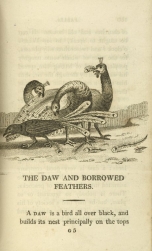
THE DAW
AND BORROWED FEATHERS.
A Daw is a bird all over black, and builds its nest principally on the tops of churches and old houses. It can be taught to speak, to say What's o'clock? and two or three silly phrases, for the sake of which some naughty people, instead of letting him spread his wings and fly through the air, shut him up in a cage, that he may amuse them with his conversation.
I do not know that a daw is either handsome or ugly; and indeed we scarcely ever call any one ugly, unless he puts on fantastical airs, and seems to say, Bless me, how handsome I am! A cobbler is thought very good company among cobblers, though perhaps he would not be called so among lords: a daw is very good company among daws, though he would not be admitted into the society of peacocks. There is nobody so ignorant or so plain, but he may find a society of his own, where, if he will be obliging and good-natured, he may be very happy.
The daw I am going to tell you of, was a good-natured, merry fellow, and the other daws liked him, and thought him clever. But, foolish daw that he was, he was not contented. In one of his flights, he happened to alight in the middle of a ménagerie of peacocks. What beautiful birds are these! thought he. Their colours, green and purple and gold, seem almost to outshine the sun. Look at that peacock with his tail spread in a complete circle! I think I never saw so fine a sight. How I wish I were a peacock! I can talk English, and do several things that a peacock cannot do; and I think I should be every bit as fine a bird, if I had but his feathers.
While the daw was thus muttering to himself, he saw a number of peacock's feathers, scattered on the ground. The thought immediately came into his head that he would try to be as fine as a peacock. Just at this moment the master of the ménagerie called his birds into a little inclosure, that he might give them their breakfast. The daw was left alone. He looked again at the feathers on the ground, and suddenly began to snatch them up, and dress himself as well as he could. There was a pond in the middle of the ménagerie, that served him for a looking-glass. By the time the peacocks had finished their breakfast, he thought himself as fine as the best of them.
They came back, and he began to strut away, and show his gold-faced clothes. The peacocks did not at first know what to make of it; they thought him an odd sort of bird. What's o'clock? said the daw. They were then very sure he was not a peacock. A peacock has a graceful winding motion with his neck, by which he shows off his beautiful colours, that are even handsomer than those of his tail. The daw tried to do that; you cannot think what a hand he made of it. It would be just the same, if a ploughman dressed himself up like a lord. The moment he said, What's o'clock? every body would perceive that he was not a nobleman; and, when he began to make his congées,
it would be impossible to help laughing.
The peacocks, when they saw what was the case, began to be very angry. They resolved to punish the daw severely for his impudence and intrusion. Accordingly, they not only plucked from him, as completely as they could, the borrowed feathers, which he had no right to, but gave him a very hard beating with their beaks. They then hooted and squalled him out of their company.
The daw, heartily ashamed of his misfortune, flew back to his brother-daws, determined not to discover to any body what had happened. But unluckily a few feathers of the peacocks still stuck about him, and his companions, knowing what a coxcomb he was, soon guessed the whole. They used him as ill as the peacocks had done, and resolved that a daw, who was ashamed of what nature and fortune had made him, should be no companion for them. They did not forgive him, till he showed strong tokens of repentance, and that he was determined never again to be proud, of what he ought to take off every night when he went to bed.
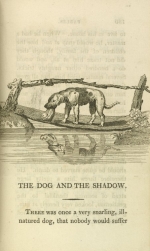
THE DOG AND THE SHADOW.
There was once a very snarling, ill-natured dog, that nobody would suffer to live in his house. When he had a master, he would snap at and bite the children of the family, though they did not teaze him at all, and would do a hundred other naughty tricks. Several masters tried him, but all grew tired, and one after another turned him out of doors. The poor dog now had nothing to eat, and was almost starved.
A gentleman who saw him in this condition, when he seemed scarcely able to drag one leg after another, took pity upon him. He knew what a naughty dog he had been; but he did not think that even naughty folks should be quite starved to death. He therefore threw him a pretty large piece of flank of beef. The dog instead of seeming thankful to the gentleman, looked very fiercely at him, growled extremely, and then snatched up the meat.
Any other dog, that had been so hungry, would have begun to satisfy his appetite immediately: but this cur, like the dog in the manger you have read of,
was always more eager to spoil other people's pleasures, than to enjoy his own. He was afraid that any dog should catch a bit of his prize. He limped away with it, and, though very weak, went further than the gentleman thought had been possible. Every two or three yards he looked round to see whether any dog was following him; but there was no one near.
Presently he came to a river, with a little foot-bridge over it. The dog got on the bridge. As he was going along, he happened to look into the water, and saw his own shadow, with the piece of meat in his mouth. He had been thinking of nothing but the fear of other dogs getting a bit of his beef, and he immediately believed that what he saw was another dog with another piece of meat. His ill-temper would not give him time to consider that what he looked at was water, and that there could not be a dog at the bottom of the water, holding his face up to the sky. I will be hanged, said he to himself, if that dog has not got a larger piece of meat than I have. And no sooner did he persuade himself of that, than he opened his mouth to snap at the piece he saw. His own piece sunk to the bottom of the river. There was the other dog still, but with no piece of meat in his mouth, and looking as surly and discontented as he did.
I do not know whether this dog ever became very good; but he certainly remembered a long while that ill-nature is not the best means of gaining even what the ill-natured person has in view. The next time the kind-hearted gentleman gave him a piece of flank of beef, he took it a little more thankfully, and ate it upon the spot, without thinking it necessary to run away with it into a forest.
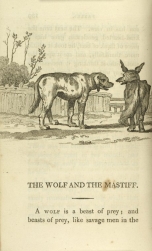
THE WOLF AND THE MASTIFF.
A wolf is a beast of prey; and beasts of prey, like savage men in the woods, must endure to be very hungry and half-starved, when they happen not to meet with creatures fit for them to eat. Yet savages and beasts of prey have their pleasures; they are stronger, and more dextrous in their motions, than the civilized and the tame.
A lean and hungry wolf happened to take his way near a village, when suddenly, on turning a corner of the road, he met a plump, well-fed mastiff. The two animals looked a little fiercely at each other at first, but the wolf suspected that the dog was stronger than he, and the dog did not perceive that the wolf was about any harm. So they fell into a little familiar chat.
Said the wolf to the dog, We are animals originally of the same class, only with a little difference in our education.
So, I understand, says the dog, Dr. Mavor observes in his Natural History.
Then why, pray, answered the wolf, should we ever quarrel with each other? And so saying, they jogged along the road together.
Said the wolf to the dog, How fat and sleek you are! You really do credit to your diet.
The simple dog replied, I am sorry I cannot return the compliment.
How do you contrive it? asked the wolf.
I live, said the dog, with an honest farmer, who takes great care of me.
Aha! answered the wolf, do not you think your farmer would take care of me too?
I dare say he might, said the dog, as you say you are the same sort of creature that I am.
And what do you do for your living?
Nothing but what is very easy. I bark, to frighten away idle people and thieves; I fawn upon my master, and behave civilly to all the family.
I have no objection to all that, said the wolf; so, if you will introduce me to the farmer, and convince him how willing a servant he shall find me, you and I will be comrades for the rest of our lives.
Agreed! replied the dog.
Saying this, they trotted along together, and were now got more than half-way to the farmer's house, when the wolf happening to take another look at his new friend, said, Cousin, what is the matter with your neck? The hair seems to be worn away quite in a circle.
The mastiff hung his head. He knew what a free and high-spirited creature a wolf is, and he wished to change the conversation. No great matter, said the mastiff: nothing at all.
Nay, replied the wolf, we are talking now upon friendly terms, and I must intreat you to conceal nothing from me.
Why, said the dog, I dare say it is nothing but the mark of the collar which my master puts round my neck when he chains me up.
Chains you up!
Yes, he generally chains me up in the day time, that I may be more fierce of nights. Sometimes I am so foolish as to be tired of my chain; and then I struggle to get loose, and howl most dismally; and then my master comes with a great club, and gives me a sound beating to make me quiet. But he gives me excellent meat every day, and as much as I can eat.
Good morning, cousin! said the wolf: I have no wish to be introduced to your kind master, the farmer. It is true I am sometimes very hungry, as I happen to be just now. But hunger shall never make me so slavish and base, as to prefer chains and blows with a belly-full, to my liberty.
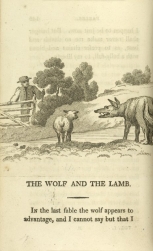
THE WOLF AND THE LAMB.
In the last fable the wolf appears to advantage, and I cannot say but that I should be disposed to be of his mind. A wolf however is a very terrible animal, and eats lambs and sheep and even little children. Thank God, there are no wolves in England!
A creature who is very hungry, and wants to eat you, will not stay to ask you a great many questions; and, if he does, I suppose will not listen very good-naturedly to your answers.
One of Esop's wolves however, that I am now going to tell you about, was of a humour to talk to his prey, and never to play the tyrant, without producing an argument to prove that it was reasonable to do so. This wolf happened to be thirsty, and went to the stream to drink. A little lower down the stream there was a pretty lamb, that, like little Red-Riding-Hood in the story-book, did not know it was dangerous to stay and hear a wolf talk, that was drinking at the same time.
The wolf looked very fiercely at the lamb, and longed to eat him up. You little knave, said the wolf, how dare you put in your nose there, and make the water all muddy that comes to me to drink!
I cannot muddy the water for you, replied the lamb, for, look you! I am lower down the stream, and the water comes from you to me.
Now I think of it, sir, said the wolf, what a pretty character that was you gave of me six months ago! How dared you say that I was a fierce animal, and fond of mutton? Now you shall suffer for your impertinence.
Indeed, answered the lamb, it could not be I; for six months ago I was not born.
If it was not you, it was your brother.
Upon my honour, I never had a brother.
A pretty fellow you are, said the wolf, to stand contradicting me thus! Know, that nobody shall say the opposite of what I say, but he shall die for his presumption.
The wolf then, almost beside himself with anger, flew at the lamb; and, if the shepherd to whom the lamb belonged had not come up at the instant, and sent the wolf growling away, the poor little creature would not have had another minute to live. So it is in this world, according to the proverb, that might sometimes overcomes right.
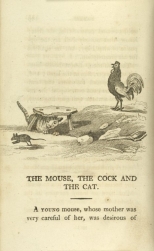
THE MOUSE, THE COCK AND THE CAT.
A young mouse, whose mother was very careful of her, was desirous of going abroad, and seeing the world. Dear mamma, said she, I do not like to be always, as they call it, tied to your apron-string. I have as many legs as either you or my father, and can run extremely fast. I have a very clear eye-sight, and shall know how to make a good use of it. Now do let me walk out quite by myself this fine morning.
Your inclination, replied the old mouse, is very commendable. Young people should learn to take care of themselves, and not always want a nurse or a servant at their elbow. But you are so inexperienced and so ignorant, I shall have a thousand fears about you. The carts may run over you, or the horses may trample you to death. Mice have so many enemies in the world!
Oh, never be afraid for me, mamma! said the young one. You shall see that I will be as quick as a hawk to discover danger, and shall always be wise enough to distinguish a friend from a foe.
Notwithstanding all that the young mouse said, his mamma could not help feeling a thousand terrors for her darling. Good bye, mamma! said the little one; you may depend upon seeing me in two hours at furthest. Good bye, my love! said the mother. Remember all I have said to you! take care of yourself!
In less than half an hour the young mouse came running back, out of breath, and all the bristles of her back standing upright with terror.
What is the matter, my dear? said her mamma. I am so glad to see you again.
Give me a minute to take breath, and I will tell you.
I am afraid you have been running heedlessly into some danger, said the old mouse, shaking her head.
Indeed but I have not, mamma! When you have heard all I have to say, you will think I have acted like a wise young mouse as I am.
After having gone through two or three fields, and looked at the daisies and butter-cups, and the cows and the ditches, I turned into John Stump's farm-yard hard by. There I examined the hogs and the dogs and the logs, and the ploughs and the rakes, that I might gain experience and know something of the world.
While I was thus engaged I spied a terrible creature on a dunghill, whom I presently knew for an enemy. I cannot tell the name of this creature; but, if I describe it to you, perhaps you can. It had got a strange piece of flesh, as red as blood, growing on the top of its head, and another, of the same colour, growing under its chin. It flapped its immensely large wings, that seemed to me like the sails of a wind-mill, and then it opened its mouth so wide, that I thought it would eat me up in a moment. Presently came out of its mouth a scream so loud and shrill, that it made every bone in my skin tremble, and I scampered away as fast as I could, and here I am safe.
It was unlucky that this should have happened just as it did, for at that very moment I saw another creature, in a part of the farm-yard not far from me, that I fell in love with at first sight. This creature was in shape not unlike a mouse, but six or seven times as big. It had a coat soft like ours, but beautifully brindled, black and grey. But what I particularly remarked was that, whereas the gentleman with the blood-coloured crest looked so savage and terrible, this gentle animal had the softest and modestest way of looking I ever beheld. The creature fixed its eyes upon me, and I believe was going to speak to me. But just then Mr. Redcrest set up his terrible squall, and I was obliged to take to my heels.
My dear child, said the old mouse, every word you speak alarms me more than the word before. The animal with the blood-coloured crest that you ran away from, is a cock, and is one of the most harmless and good-tempered creatures in the world. The other animal that took your fancy so much, and that you fell in love with at first sight, is a cat, an implacable enemy to the whole generation of mice, and that will sometimes murder twenty of us in a morning. If she had come one step nearer to you, I should never, never have seen my darling again. From this you may see how very necessary a thing experience is, how much young people should mistrust their own judgments, and how foolish a creature he is who yields an implicit confidence to appearances.
The young mouse, after this lesson, grew much more attentive to what her mamma said, and her mamma in consequence loved her more tenderly than ever.
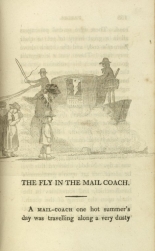
THE FLY IN THE MAIL COACH.
A mail-coach one hot summer's day was travelling along a very dusty road. There were several passengers all in a great hurry to get to their journey's end, and the coach drove very fast. There was a clergyman going to preach his probation sermon the next day: there was a lawyer hastening to settle who had the best right to a great estate: and there was a young couple in a hurry to be married. Beside this, there was a bag of letters, some on very urgent business, and some inclosing bank-notes to a considerable amount. So that, you see, what this coach carried was all together of some importance.
In the coach among the passengers was a fly. Nobody observed this fly; he sometimes sat upon a gentleman's hat, and sometimes upon a lady's handkerchief, and sometimes in the shade upon the lining of the coach. But the fly was in his own judgment of more importance than all the rest; indeed he had so high a conceit of himself, that he absolutely forgot there was any body else in the coach. He thought it a very nice thing to travel so fast without feeling fatigued, and he was in as great a hurry to get to London, which he had never seen, as any of the human passengers.
It happened as they drove along at a great rate, that a large school of little gentlemen and ladies was walking along the causeway. It was a holiday; they had all been very good; they were dressed in their best clothes; and their school-mistress was taking them to a nice dairy-house, to treat them with syllabub
and cheese-cakes. As the coach drove by, the wind set full in their faces, and the poor children were almost blinded with the dust. The fly looked on very attentively at all that was passing.
Upon my word, said the fly, I am very sorry for those children. I am quite grieved that I should incommode them thus. If I had not been so extremely in a hurry, I would really have desired the coachman to stop, till they were past. But a person of my consequence cannot pass through the world, however excellent his intentions may be, without frequently occasioning inconvenience to his inferiors.
A pretty butterfly, who heard this self-conceited speech, could not help rebuking this coxcomb fly. You insignificant little insect, do you think any body here knows any thing about you? I dared not come into the coach, till I saw that there were no children in it, because nature has thought proper to adorn me with brilliant colours, which often bring on my ruin from naughty boys and girls who do not recollect that a butterfly can feel.
But you may go through the world, unnoticed by any body, unless it be by a spider. Do you think the coach goes one step the faster of slower, because we are in it? Take my word for it, my friend, that the most ridiculous creature in the universe, is he who entertains a big imagination of his own importance, that no one ever dreamed of but himself.
The fly was so ashamed at this just rebuke from his brother-insect, that he crept into a crevice made by a corner of the worsted-binding of the coach, and never showed himself any more, till he smelled the butcher's shambles
in Whitechapel, as he entered London from the east. He then roused himself from his hiding-place, and flew away to his dinner.
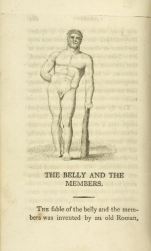
THE BELLY AND THE MEMBERS.
The fables of the belly and the members was invented by an old Roman, who lived two thousand three hundred years ago. Latium, of which Rome was the capital, was then a country of barbarians, who had no better way of marking the beginning of a new year than by driving a great nail into the church-door, which the chief magistrate did in great ceremony, attended by all his officers. The fable of this grey-bearded savage, who could neither read nor write, is very unlike most other fables, but it is very entertaining, and has a great deal of good sense in it; and therefore I will tell it to you.
Once upon a time the members of the human body fell out with the belly, and declared they would no longer have any correspondence with her. They complained that she set them all to work, and never did any thing herself: the legs would no longer walk to fetch her meat, the eyes refused to look for it, the hands to lift it to the mouth, the tongue to taste, and the teeth to chew it. By this general conspiracy, said they, we shall speedily bring her to reason, and teach her of how much importance we are, and how useless she.
The belly was in a pitiful taking; all her servants refused to do any thing for her; and she was quite unable to help herself. She became lank and shrivelled, and her ribs almost forced their way through the skin. Now you will think the members triumphed.
The belly is not so unimportant a part of the human figure as the members supposed. She foresaw very well how this conspiracy would end; she watched her time; she sat still, and said nothing.
The members were surprised, when they saw that they all suffered in the misfortunes of the belly. They grew lean and feeble, as she grew so. The legs at first refused to walk; they were now unable to do it; they tottered, and could not keep themselves in a firm and steady position. The fingers had grown cold and stiff; the eyes were glazed and could not distinguish objects; the tongue could not speak, and the jaws were almost locked. All was now tame, and they were willing to hear reason even from the belly that they had despised.
What fools you were, said she, to think you could go on without my aid! Learn henceforth that it is not always that which makes the greatest show that is of the most real use. Scavengers and shoeblacks have their value in a great city, and ought not to be reviled. My office is ignoble, and I do not pretend to vie with the more glorious members of the body; yet without my services the tongue cannot utter that eloquence which has converted senates, the hands cannot rescue the miserable from destruction, nor the head invent those sciences and arts which raise the human, so far above the brute creation. You thought I did nothing, but you were mistaken. Within my quiet house, where every thing seems so still, goes on the great operation of digestion, by means of which the food that is put into the mouth, is turned to animal substance, and is then conveyed to the different members to maintain them all in health and activity. Come, my friends, let us return to the agreement and kindness in which we have been accustomed to live. It is not yet too late. Feet, you can yet creep a little way, far enough to find some food: hands, you are not so weak but you can grasp it, and carry it to the mouth: teeth, you must resume your office, to chew it well; otherwise it will stick fast in the throat, feeble as the power of swallowing now is, and death will be the consequence.
The members listened to the prudent advice of the belly. They took a slender and a sparing meal, and were refreshed; the next time less caution was necessary. In a few days the health of the whole was restored, and all the members were as vigorous as ever; and they never after forgot the useful lesson which dire necessity had thus taught them.
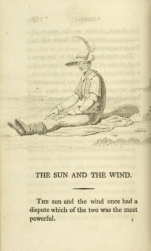
THE SUN AND THE WIND.
The sun and the wind once had a dispute which of the two was the most powerful.
The wind, said, Do you pretend to compare with me? Do not I tear up the tallest trees by the roots? Do not I level palaces and towers in the dust? Do not I raise the ocean into combustion, swell the billows to the size of mountains, and send whole fleets of ships, with all their crews, to a watry grave?
I grant, replied the sun, these are formidable powers; but they do not equal mine. I open the buds and the flowers, to make glad the heart of man. I cause the grass to grow. Every thing that you see through the whole world, that possesses either vegetable or animal life, owes its health and prosperity to me: were my life-giving influence withdrawn, they would all perish.
As the disputants were in the height of their argument, a traveller happened to pass along, with a large cloak wrapped about his shoulders. His path lay across a vast plain, where there was neither house nor tree that could shelter him from the inclemencies of the weather. The sun and the wind both agreed to settle their dispute by a trial on this traveller, which of them could first make him part with his cloak.
The wind began with a terrible puff, that tore away the traveller's cloak from one of his arms, and was near carrying it a mile from him upon the plain. He however recovered his hold, and drew it closely round him. The heavens were now entirely darkened with clouds. The day was turned into night. The wind raved so, that, if the traveller had had a companion instead of being alone, they could not have heard one another speak. He could scarcely keep his feet, or get forward one step; and he almost thought that he must lie down upon the ground, to preserve himself from the violence of the storm. The wind besides called to his assistance the rain, the hail, and the thunder: I do not know whether that was quite fair. The traveller had a terrible time of it: but, for all that the wind could do, he only hugged his cloak the closer about him.
It was now the sun's turn to try. He burst out with his refulgent rays, and the clouds were scattered in a moment. Every thing was refreshed. The flowers seemed to smile; the beasts returned to their pasture; and the soft droppings from a few scattered bushes were inexpressibly agreeable. The drops glittered in the sunshine. As the sun however was determined to do his utmost, he made his beams hotter and hotter; till the traveller, who was at first exhilarated with his brightness, began to pant and sweat with the sultriness of the season. He loosed some of his buttons to relieve himself, and threw his cloak wide open. At last however he could bear it no longer; he cast it from him upon the ground; he sat down upon it, to try to cool himself; and the sun was decisively the victor in the strife.
Learn from this, said the sun to his blustering competitor, that soft and gentle means will often accomplish what force and fury may in vain try to effect.
From this time the sun was always admitted to precedence over the wind, and Apollo, the charioteer of this great luminary, ranked among the Heathen Gods far before Eolus, the ruler of the tempests.
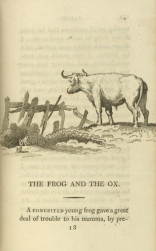
THE FROG AND THE OX.
A conceited young frog gave a great deal of trouble to his mamma, by pretending on all occasions that he could do any thing he had a mind to do. I do not much dislike your notion, said his mother, if you would put more consideration and sobriety into your way of thinking about it. Ambition and industry, when directed to a good end, are excellent qualities, and will effect wonders. Yet all power has its limits. Man is perhaps a still more extraordinary creature than a frog; let us see what he can do! With ambition and industry perhaps almost every man may make himself a good farmer, a good sailor, a good soldier, a good surgeon, and excel in almost any employment or pursuit; but I question whether he can climb to the moon, or carry away the north-star in his waistcoat-pocket. And in the foolish way in which you set about it, my child, without persevering ambition or industry, and only saying off-hand, I will do it, he can achieve nothing that is worth doing.
The foolish young frog did not heed what his mother said, but went on in his empty, bragging manner. I question whether, if he had heard Viotti
playing on the fiddle, he would not have said, give me hold of it, and I will fetch out of the strings in a minute as miraculous music as you do. What I am going to tell you of him was quite as silly as this.
The young frog and his mamma were once basking in the shade on a beautiful summer's day. Near them in the same field a remarkably fine ox was feeding upon the grass.
What an admirable creature that is! said the mother.
Do you think he is as handsome as I am? answered the young frog.
Handsomer, said the mother. Not to mention his beautiful dappled marks of reddish brown and snowy white, and the sleekness of his skin, so expressive of health and vigour, there is something in size itself, when united with exquisite colours and forms, which affords great delight to the beholder. Size is expressive of power; this ox looks like the monarch of the plains; yet there is something so gentle and sweet in his temper, that one reverences without fearing him.
Oh, as for that, said the young frog, I will show you that I can be as big as an ox in a minute.
Consider, my dear child, said the mother, what you are doing! Recollect what I have so often said to you!
I do not remember at this moment what you mean, answered the young frog. But I will ask you all about it to-morrow.
So saying, he began to hold his breath, and puff himself up as much as he could. The skin of the frog is very wrinkled, and he really enlarged himself to almost twice his natural size.
He could not speak, without letting out his breath, and sinking to his natural figure.
Was not I then as big as the ox? said he.
Not the hundredth part of his size, answered the mother.
He tried again, and held his breath so long that I really believe he was a quarter of an inch bigger round than the first time.
What do you think of that, mamma? said he.
Not the fiftieth part, replied the mother.
I will try again. You accused me just now of wanting perseverance.
In the midst of his third trial, the ox was looking for some fresh grass, and, not observing so diminutive an animal, had like to have trod him to death with one of his hoofs. The young frog, thoroughly frightened, let go his breath, and scampered away in a trice; and I believe he never after talked of making himself as big as an ox.

THE HORSE AND THE STAG.
The horse was once a free and a noble creature, and galloped about the forests just as his fancy prompted him, without carrying another creature upon his back. In days of yore, when man lived upon acorns and roots, and had neither coach-house nor stable belonging to him, the horse was equally unacquainted with the saddle, the bridle, the whip, and the spur.
In these happy times (happy for the poor horses), when they had nothing to do, but to prance along the plains, and neigh to their gamesome mates, a horse once got into a quarrel with a stag. It began in play, as the quarrels of children are apt to do; the horse tossed his head wantonly to the stag, and the stag did the same in return. But the stag had horns, and the horse had none; so the stag, without thinking any harm, gored the horse in his beautiful neck, and the blood began to gush out in a stream. The horse did not like to see his blood trickle upon the ground, and the wound smarted a good deal. The good-natured stag was very sorry, but the horse did not care; he declared that one way or other he would be even with him.
The horse was a long while considering how he should accomplish his revenge. His perplexity was not, as I have read in some book, that he could not overtake the stag; for I doubt whether his taking a man upon his back, which was the scheme he thought of, would at all have increased his power of doing that. But he was no way superior to the stag he quarrelled with in weapons of offence, and his want of horns made him sure that he should be the loser in a battle.
At last, as I was saying, the horse applied to man for his assistance. I know, observed the horse, that there is no food that pleases the human palate so much as venison; but you can but seldom get it. Your feet cannot run so fast as the deer; mine can; but that is all I can do. When I have overtaken him, he only turns about and tosses his head at me. I know a stag that I am sure would be the finest eating in the world, and he has given me an affront. Perhaps we could find a plan, by joining my swiftness and your skill together, of humbling this proud fellow in the dust.
I can easily tell how that may be done, said the man, provided you will listen to me, and do as I would have you. The horse consented; and the man, having put a bridle upon him, with a bit in his mouth, leaped upon his back, and rode away in search of the stag. They presently found him.
It was now quite a different affair for the poor stag, from what it had been when the horse and he played together in the forest. Several of the stag's relations had been gored by the spear of the man already, when the hunters lay in wait for them, concealed behind a tree or a hedge; their dependence then, if they were not taken by surprise, was upon the superior swiftness of their feet; but now that the poor stag saw the hunter mounted upon the back of the horse, and the terrible spear ready grasped in his hand, his heart sunk within him. What he could however he did; he ran for his life. He ran for hours. At last, panting, gasping, his legs no longer able to support him, he fell at his length on the ground. The man came up, and the spear pierced the stag to his heart.
The wicked, cruel horse, when he saw his enemy dead at his feet, neighed for joy. Was not this a barbarous revenge, because the stag had merely razed the skin of the horse's neck? I wonder what happened to the horse afterward. Something terrible, you may be sure.
The horse thanked the man for having so well assisted his desires. Now, thought he, I shall reign unrivalled lord of the forest; no creature will henceforth dare to insult me. I shall remember your kindness, said he to the man, when I shall no longer have the pleasure of seeing you.
Fair and softly, replied the hunter, you and I do not part so. Having been once upon your back, I find that you will be a very useful beast to me. I have a pretty hovel, and you shall live in one room of it. I shall be able every holiday to treat myself with a pleasant ride; and every working day you shall plough my field or draw my cart. The horse had no remedy; the man, having once been his master, was always his master; and a hundred and a hundred times, when the horse came in weary from a sharp day's work, he had occasion to reflect, that vengeance, too eagerly pursued, always brings the revengeful party to misery.
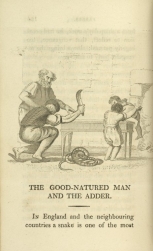
THE GOOD-NATURED MAN AND THE ADDER.
In England and the neighbouring countries a snake is one of the most harmless creatures in the world; but in the hot climates, and particularly in Africa, there is great plenty of venomous snakes and serpents, whose bite is death. There are the asp, the rattle-snake, the cerastes, and many others, beside the basilisk,
which is regarded by the inhabitants with so much terror, that they have imagined it could kill by the mere stroke of its eye-beam. Many of these serpents are very large, and their colours so beautiful, that they look in the sun as if they were studded with diamonds and carbuncles;
they have a tongue, which is forked like a dart; and, whenever they are angry, they utter a strong hissing sound, at the hearing of which the people of those countries are frightened nearly out of their wits. They are shaped like a worm, without legs; but, by drawing themselves up, and then tossing out their folds, they get forward with great rapidity, and some of them could overtake me, though I should run away from them ever so fast. There is a famous story in Virgil, the Latin poet, of Laocoon, a priest, with his two sons, who were all three killed by two terrible serpents;
and there is a fine statue representing this, which, some day when you are good, I will take you to see at Somerset House.
The commonest name for these venomous serpents is a viper, or adder; and therefore, when one man is furiously angry with another, we often read that he calls him a viper, and reproaches him that he has the tongue of an adder.
There was once a poor man, but he was very good-natured, and would never pass by any creature in distress, without trying to assist it. This made him many friends; even the dogs and the cats, and the cows and the sheep, knew the good-natured man, and gave him marks of their attachment; and the robin-redbreasts (for the country where he lived, though hotter than England, was sometimes covered with snow; I believe it was Italy) would come to his window, and eat up the crumbs that he scattered for them. It is seldom that you can be wrong in doing an act of kindness.
Once however this poor man went too far, and had like to have repented of his kindness. I would relieve a naughty boy, who was a notorious liar or thief, if I saw him starving; but I would not take him to live in my house, or make him my bosom-friend.
It happened to be a very snowy day, and the wind seemed to cut sharp like a knife, when this poor man came home to his dinner. In one corner of a field, as he hastened along, he spied an adder, that seemed almost frozen to death. Though he was in a hurry to get to the shelter of his own hovel and his fire-side, and his fingers were all numbed with the cold, he could not bear to think of leaving this poor creature behind him in so miserable a condition. He turned it over; it was quite stiff, and its eyes were shut; he began to believe that it was dead. Once however that he touched it, he perceived that it moved. He unbuttoned his coat, and put it in his bosom, that it might get warm there. I am afraid, if the adder had fully recovered in that place, it would perhaps have stung its benefactor to the heart.
When the poor man got home, he took out the adder, and saw that it was a little better; it half opened its sparkling eyes. He laid it on the hearth, and told his children what he had done; they gathered round, and admired the beautiful colours of the creature. As the fire sparkled and blazed, the adder got stronger and stronger. For a considerable time however it lay perfectly still; when, on a sudden, it started up in full strength, reared its beautiful head, flew about the kitchen from one end to the other, and hissed most terribly. The children screamed and shrieked; the bigger ones leaped upon the tables and chairs; and at last the venomous beast seemed to dart at one of them, and in a moment longer would have stung it to death.
The poor man was so terrified that he did not know what to do; but a neighbour who passed by, heard the noise, and, knowing that this was the house of the good-natured man, opened the door in haste, and with a bill-hook
that he had in his hand, struck the adder on the head, and laid it dead at his feet: a fit return for the creature who behaved so ill to the poor man that had saved his life. The neighbour did not care for the danger to himself, when he saw how much mischief hung over the family of the good-natured man.
The good-natured man learned a wise lesson from this adventure: he saw how much mischief he had nearly brought upon himself by a kindness that paid no attention to the different qualities of living creatures; but then he saw that the life of his child had been saved by a person, to whom he had once acted generously, without acting imprudently.
The only thing that puzzles me in this story is the behaviour of the adder. It is contrary to the nature of all animals; for I have found it almost an universal rule, that no creature will harm you, if you have not first done that creature harm.
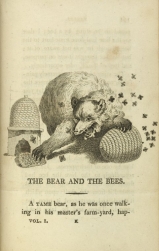
THE BEAR AND THE BEES.
A tame bear, as he was once walking in his master's farm-yard, happened to be stung by a bee: I dare say the bear had done some hurt to the bee, though he was not aware of it; but the bee thought it was on purpose, and treated the offender accordingly.
The sting of a bee is extremely painful for an hour or two; it inflames the flesh very much; but the next day you are as well as if nothing had happened. The bear felt the smart, and was very angry that so little a creature as a bee, had dared to treat an animal of his importance so unceremoniously. He resolved on revenge, and determined to punish the whole community of bees, for the injury which had been done him by one of their species. He went accordingly to the hive the bee had flown out from, and with his snout pushed it from the shelf upon which it stood, and overturned it upon the ground. There, said he, take that! and beware another time how you behave impertinently to a bear!
The bees were exceedingly enraged. Their combs are formed in the nicest order, of wax; every one of the cells has exactly six sides; and the whole together is like a great city. Here was the whole city of these poor bees overturned in a moment by the unreasonable vengeance of this stupid bear. More than a hundred bees flew out at once; they all fixed upon the bear, and stung him in every part of his body and head. If you had been served so, though the sting of one bee does no lasting harm, I believe all together it would have killed you. The bear was several days in exquisite pain, and as hot as fire; and had time enough to reflect how foolish, as well as wicked, it is, in return for one trifling injury, to put ourselves in a great passion, and do all the harm we can.
The farmer's son came, and put the hive upon the shelf again, which the bees could never have done themselves. They were however a long while before they had repaired all the disorder the bear had committed, and some of their young ones were crushed to death.
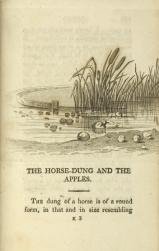
THE HORSE-DUNG AND THE APPLES.
The dung of a horse is of a round form, in that and in size resembling an apple. I hardly need tell you that in all other respects it is different. It was I suppose in a straw-yard, where horses are used to be kept, that a great deal of rain having fallen, one of these balls was set a swimming along the kennel,
and at length arrived at the pond which had been made in a corner of the orchard for the cows to drink at. Over this pond certain apple-trees, golden pippins and others, of a smooth and glossy rind, or a beautiful blush, extended their well-stored branches. Several apples, either from their ripeness, or being shaken down by the wind, had fallen into the water, and were floating on the top of the pond. I once had a little brother, two years old, who, having wandered by himself to the edge of such a pond, and not knowing that water would drown him, was so attracted by the beautiful appearance of the floating apples that he went forward to take them, fell into the water, and was killed.
The horse-dung I was mentioning, was quite intoxicated with his situation, as he swam this way and that upon the surface of the pond. He had never been in such good company in his life. There was not a thing of any sort floating within the whole circumference of the pond, that was not an apple, but himself. He quite forgot his origin and nature. In the pride of his heart he could not help crying out as he glided along, See how we apples swim!
This is but a short fable; but it is intended to show that, if any one, favoured by fortune, or admitted into the society of those who are wiser or better than himself, forgets what he really is, and claims a value that does not belong to him, he makes himself completely ridiculous, and provokes the contempt of every one who knows him.
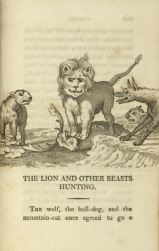
THE LION AND OTHER BEASTS HUNTING.
The wolf, the bull-dog, and the mountain-cat once agreed to go a hunting with the lion. I have told you before what a terrible creature a lion is; a wolf is but a shrimp to him; and ten bull-dogs together would scarcely venture to set upon a lion, though he should be tied to a stake, and so prevented from following them whenever they chose to run away. These creatures therefore were glad to have a lion for their partner, who they knew was so much stronger than they; and the lion was contented to join them, because various animals have various accomplishments, and at worst they could be set at different openings of the forest to drive the prey into his mouth. You have not forgotten that beasts of prey are obliged to go a hunting, as otherwise they would starve. They cannot eat grass. The agreement of these partners was, that whatever game any one of them should take, he was not to touch a morsel of it, till he had called together his associates to be present at the division.
Of the whole set the mountain-cat was the most cunning in her tricks, and she somehow or other happened to catch a deer in her nets. What her nets were made of I cannot tell; but it is only a fable, so we will not mind that. As soon as she perceived her success, she very honourably sent round one of her kittens, to give notice to her new-made friends. They hastened to the banquet; each of them brought along with him the best sauce, which is hunger. As soon as they were assembled, the lion said, Now, madam, and you two gentlemen, I dare say you have no objection to my being the carver; I will divide the deer into quarters in a trice.
Saying this, with one pat of his terrible paw he deprived the animal of life and then set himself seriously to work. He divided the carcass with great expedition, and the portions were so equal, that it was not possible for him who had any one of the shares, to murmur because he had not one of the others. The partners looked on with great earnestness and curiosity; their mouths watered; they licked their lips and were impatient to be served.
Well, my friends, have I divided our feast fairly? said the lion.—Every one praised the magnanimity of their captain.
I am glad, said he, you are so well satisfied with my proceedings. Now for the distribution! This share, laying his paw upon one, I claim, because I am the king of beasts; nobody will dispute that. This second share, touching another, I will have, in my own right as the strongest and boldest of all the members of our association; the third, do me the favour to observe, I will take in spite of your teeth; and as to the fourth, I have only this to say, Let him touch it that dares!
The poor animals were terribly mortified. They would have complained, and expostulated with the lion upon his injustice. But he put himself into a threatening posture; and they slunk away with their tails between their legs. He thought they did not vanish quick enough, and set up one of his loudest roars; they then ran as fast as they could, and sought in the remotest parts of the forest for any little morsel to appease the cravings of hunger. It is too often thus, when one human creature has a great deal more power than his neighbours; and therefore, if you should happen to be richer or stronger than your brothers, or sisters, or play-mates, I hope you will be just enough not to take the lion's share; and remember that it is not every one who has not the courage to complain, that has not the right to do so if he dared.
END OF VOL. I.
_____________
Printed by B. McMillan,
Bow-Street, Covent-Garden.
THOMAS HODGKINS
at the Juvenile Library, on the north side of Hanway Street (opposite Soho Square), Oxford Street, London, takes the liberty to inform the Nobility and Gentry, as well as Parents and Preceptors in general, that he has just opened a Magazine of Juvenile Publications for the amusement and instruction of the rising generation. All persons who honour him with their commands, may depend upon being served with the utmost attention and punctuality: and, as it is his design to publish with all practicable expedition, a Series of Works in French and English, upon subjects which shall appear calculated to improve the understanding, the taste, and moral habits of the young, he flatters himself that such Parents and Governors as are anxious for the improvement of the Children under their care, will find their advantage in visiting his Assortment, and obliging him with their Orders.
N.B. Schools supplied. Letters from any part of the United Kingdoms (post paid) will be duly attended to.
T. Hodgkins likewise offers to his Friends and the Public, a choice Collection of School Books; also Cyphering Books, Copy Books, Copper-plate Copies, Quills, Pens, Inkstands, Slates, Black-lead Pencils, Maps, and Stationary of all kinds.
Ladies may be supplied with Coloured Papers, and Polished and Embossed Note Papers of every denomination. Likewise Cards of Compliment, and Visiting Cards, Plain, Gilt, or with Borders.

